 10/08/2009 15:58 10/08/2009 15:58 |
|
| | | OFFLINE | | Post: 18.142
Post: 801 | Registrato il: 28/08/2005
Registrato il: 20/01/2009 | Administratore | Utente Senior | |
|

 Earlier stories posted today (8/10) in the preceding page.
Earlier stories posted today (8/10) in the preceding page.

 THE UNRELENTING BAD FAITH
THE UNRELENTING BAD FAITH
OF THE CHIEF RABBI OF ROME
In reporting the unsolicited reaction of an Italian Jew yesterday to the Pope's Angelus message about the Nazi concentration camps, I could not help commenting: "But I fear that other Jews may not share his conclusion that this should close the book about the doubts they express at every possible occasion on the Pope's own good faith with respect to the Jews."
I was hoping the comment would be some sort of mantra that would preclude any bad-faith reactions to the Pope's words, but it didn't work, alas, (So much for my superstitions! And so much for trusting that some ideologically intransigent Jewish leaders would somehow show good faith for once.)
Read this comment:

"I don't see any step forward. The problem remains his [the Pope's] interpretation of the Shoah and Nazism, namely, that the Nazis were simply a band of delinquents who held the entire German nation in their grip.
"With respect to this thesis, the Angelus message does not bring substantial change. On other occasions, Benedict XVI has been contested - at his visit to Auschwitz and to Yad Vashem - because he has kept Germany and the German people apart from responsibility for Nazism.
"As far as this goes, I don't think the Pope has changed his line at all."

The culprit is the Chief Rabbi of Rome, Riccardo Di Segni, who was the one Jew who could be counted on to raise a dissenting voice, as he has done in an interview published today in La Stampa, in which he says the same thing over and over.
Di Segni obviously has an unhealthy obsession on this issue, not to mention flagrant bad faith and an utter lack of charity in the Christian sense. Being Jewish does not excuse him from having, if not charity, then at least, some good sense and good faith, as well as elementary decency and respect towards the Pope. It doesn't even pay to argue against his twisted logic.
I feel sick to the stomach to think that the Pope may be visiting the Synagogue of Rome of which this man is the Chief Rabbi!
By the way, Mr. Di Segni, the Pope does not say what he says - about Nazism or the Holocaust or other subjects, for that matter - to please anyone, least of all congenital fault-finders like you, but because he is simply speaking the truth, lower-case and capital.
P.S. The next time you say a prayer for the Jews, say a special one to the Holy Spirit for those like Mr. Di Segni. If I were in Church right now, I would light a candle for that very intention.
 AND YET, THE POPE SAID SO MUCH MORE
AND YET, THE POPE SAID SO MUCH MORE
THAN SIMPLY DENOUNCING THE NAZIS
It is unfortunate that most commentators so far - and the news agency reports - have focused on the Pope's denunciation of the Nazi concentration camps without pursuing his thought into its greater significance: the link that leads from Nazism to contemporary nihilism and man's substitution of himself in place of God.
Every time I translate what the Pope says, his message always seems so self-evident and crystal-clear that I take it for granted it would appear so to everyone, particularly those whose livelihood and responsibility it is to report on the Pope. But it is not always so, and yesterday's Angelus message was an example.
It was a masterful unforgettable presentation in a few brief paragraphs that bear repeating, underscoring and reflecting on:
The Nazi concentration camps, like every extermination camp, can be considered extreme symbols of evil, of the hell that opens on earth when man forgets God and substitutes himself, usurping God's right to decide what is good and what is bad, to give life and death.
Unfortunately, however, this sad phenomenon is not limited to concentration camps. But the camps are the culminating point of an ample and widespread reality, often without fixed boundaries.
The saints whom we have mentioned briefly allow us to reflect on the profound differences that exist between atheistic humanism and Christian humanism - an antithesis that traverses all history, but which, at the end of the second millennium, has reached a crucial point in contemporary nihilism, as the great writers and thinkers have perceived, and as events have amply demonstrated.
On the one hand, there are philosophies and ideologies, but also modes of thinking and behavior, which are seen as alternatives to God, in such a way as to transform man himself into a god, who makes arbitrariness his system of behavior.
On the other hand, we have the saints, who, by practising the Gospel of love, give reason to their hope. They show the true face of God, who is love, and at the same time, the true face of man, who is created in the divine image and likeness.
 I doubt that someone like Mr. Di Segni even read anything outside of the words 'Nazi concentration camps'.
And here comes the other Italian Jewish leader who can always be relied on for an aggrieved and accusatory knee-jerk reaction [I would call it by its more scientific name, Pavlov's-dog reflex, that I generaly use for other bigots, except that I might be accused of raging anti-Semitism if I so much as use the word 'dog' anywhere near a Jewish name] to anything the Pope says that remotely has anything to do with the Jews.
I doubt that someone like Mr. Di Segni even read anything outside of the words 'Nazi concentration camps'.
And here comes the other Italian Jewish leader who can always be relied on for an aggrieved and accusatory knee-jerk reaction [I would call it by its more scientific name, Pavlov's-dog reflex, that I generaly use for other bigots, except that I might be accused of raging anti-Semitism if I so much as use the word 'dog' anywhere near a Jewish name] to anything the Pope says that remotely has anything to do with the Jews.
Frankly, I think people like Di Segni and Laras live day to day with their tongues hanging out in panting expectation that Benedict XVI might say something they could comment on, because that is the only way they would get their name in the headlines. They're no better than all the C-to-Z-rated Italian showbiz barnacles who have discovered that to attack the Pope is the best way to merit a headline they would otherwise never get.
{"Omigosh!" Laras said to himself, "Di Segni has one-upped me! Let me talk to someone and upstage him with my more erudite and profound comments!] This man is a professor of Jewish philosophy and author of books on Judaism - so, the fact that he makes asinine statements like he makes is blatant proof of his ideological blindness and, I might even say, of a naked hostility to Christians.
But think what a cheap thrill it must be for him to be lecturing in public to the most intelligent public leader on earth and one of the great intellectuals of our time! WOW! Big deal for a flea riding on an elephant's back! .
 Laras says the Pope forgets
Laras says the Pope forgets
that the Nazis were Christians

VATICAN CITY, Aug. 10 (Translated from AKI) - "I wish to remind the Pope that the concentration camps were set up by Nazis who were Christians, and even they had usurped from God the right of life and death over others. [DUH! ISN'T THAT EXACTLY THE POPE'S POINT? You'd think Benedict had been defending the Nazis!] In short, the Pope forgets that many Nazis were Christians." {Not as Christians that the Pope speaks of - let Laras cite the history books that say the Nazi leaders were practising Christians in any way, nor professed to be Christians at all once they were in power!]
That is what Rabbi Giuseppe Laras, president of the Rabbinical Assembly of Italy, told ADNKronos.
To confront this subject [Nazism, I suppose) only in a theological and philosophical way is to "de-historicize a phenomenon which goes beyond philosophy and requires a sociological and anthropological analysis". [YEAH RIGHT! As if a 5-minute Sunday homily was the place for such an analysis. And what is there to analyze from that point of view, anyway, that is not as obvious as the supersized beam in Laras's eye to even the simplest person who is aware of what Nazism was! They were evil; they killed people they did not like or did not think deserved to go on living. Can there be any deeper socio-anthropological statement of Nazism than that?]
"Moreover, I wish to say I am sure that John Paul II on the same subject would have made a different discourse altogether. Wojtyla had the ability and the desire to make himself understood, whereas Benedict XVI seems too complacent about his own thinking and his discourse ends up being too metaphysical". [AAARGHHHHH! Laras has not only lost all common sense, he has also overstepped all bounds of elementary decency and fair play!]
 I CAN ONLY BE THANkFUL THERE ARE ONLY 45,000 JEWS OR THEREABOUTS IN ITALY - it means that the direct influence, if any, of the likes of Di Segni and Laras cannot theoretically go beyond those 45,000 in a country of 60 million!
I CAN ONLY BE THANkFUL THERE ARE ONLY 45,000 JEWS OR THEREABOUTS IN ITALY - it means that the direct influence, if any, of the likes of Di Segni and Laras cannot theoretically go beyond those 45,000 in a country of 60 million!
Di Segni and Laras are not men of dialog at all - much less of good faith and good will! All they're interested in is playing GOTCHA! no matter how wrong they are!
I am lighting 45,000 candles symbolically.
[Modificato da TERESA BENEDETTA 10/08/2009 23:52] |
| |
|
| |
 10/08/2009 20:23 10/08/2009 20:23 |
|
| | | OFFLINE | Post: 164
Post: 1 | Registrato il: 28/05/2007
Registrato il: 19/02/2009 | Utente Comunità | Utente Junior | |
|
![[SM=g7707]](https://im0.freeforumzone.it/up/0/7/2527896.gif) ![[SM=g7707]](https://im0.freeforumzone.it/up/0/7/2527896.gif) ![[SM=g7707]](https://im0.freeforumzone.it/up/0/7/2527896.gif) ![[SM=g7707]](https://im0.freeforumzone.it/up/0/7/2527896.gif)
The sad part is that all those Jewish 'leaders' are so smug and self-righteous, because they're dealing with a German Pope.
For Germans - even for the Pope - negative statements about Jews are not allowed. Even if they are just and called for.
It's simply not possible.
Even for Joseph Ratzinger, who has never cared about political correctness, or about pleasing the press or his opponents. Even he has to yield to that unspoken law, in order to prevent serious damage to the Church.
Even if his response would be in the usual Ratzingerian, refined and rational way... just imagine: German Pope attacks Italian Jewish leadership. The perfect headline for some Jewish and liberal circles.
If I was a cynic, I’d even think they’re trying to coax him into doing just that.
But realistically, even those closed minded people most likely have come to terms with the fact that he’s way too intelligent to fall for their games.
Of course they praise JPII. They were never courageous enough to attack him so bluntly. He was on the good side during the Nazi terror. And he surely would have had something 'nice' to say to those 'gentlemen'. He certainly wasn’t to be messed with.
![[SM=g8126]](https://im0.freeforumzone.it/up/0/26/3169140.gif) (I love the explosion smilie!!)
(I love the explosion smilie!!)
 THANKS, Heike, for being the proverbial cooler head! And for bringing up the politically correct German 'taboo' on saying anything that could be construed as being 'anti-Jewish' in any way!
THANKS, Heike, for being the proverbial cooler head! And for bringing up the politically correct German 'taboo' on saying anything that could be construed as being 'anti-Jewish' in any way!
No one can reasonably expect all Germans to apologize forever for what the Nazis did. It's not the way the world works. Regardless of the historical, social and cultural circumstances that made Nazism possible, the German nation over time cannot be made to take the blame for what specific Germans did at a specific time in history.
It's like radical American blacks today wanting to blame the American nation forever for slavery and pre-civil rights injustices. Or Muslims stigmatizing Christians forever because they are permanently offended by the Crusades (even if they have misrepresented it terribly).
This kind of 'mass guilt' thinking simply displaces the blame from those who were truly culpable. Just as, from the rhetoric of some militant Jews, one would think Pius XII alone should bear the blame for the Holocaust, and not Hitler, the Nazis and the godless, inhuman ideology they put into practice.
And now someone like Laras would make it appear that "the Nazis were Christians, so ultimately, it's really the Christians to blame for the Holocaust".
The Holy Father must spend an inordinate amount of time praying for his irrational and hysterical critics!
TERESA
[Modificato da TERESA BENEDETTA 10/08/2009 21:08] |
| |
 11/08/2009 13:55 11/08/2009 13:55 |
|
| | | OFFLINE | | Post: 18.145
Post: 804 | Registrato il: 28/08/2005
Registrato il: 20/01/2009 | Administratore | Utente Senior | |
|

Tuesday, August 11
 ST. CHIARA(CLARE) OF ASSISI (1194-1253)
ST. CHIARA(CLARE) OF ASSISI (1194-1253)
Virgin, Founder of Poor Clares
OR for 8/10-8/11/09:
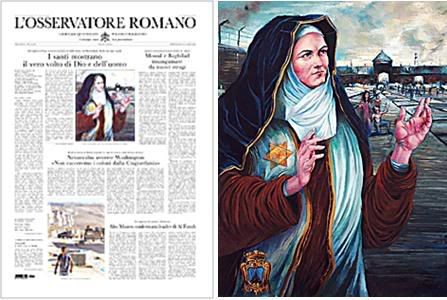 Illustration: St. Theresa Benedicta of the Cross by Conversano.
Illustration: St. Theresa Benedicta of the Cross by Conversano.
At the Sunday Angelus, the Pope recalls the martyrdom in Auschwitz
of Edith Stein and Maximilian Kolbe:
'The saints show us the true face of God and the true face of man'
Other Page 1 stories: More terror-bomb killings in Mosul and Baghdad; Israeli PM
Netanyahu tells US Israel won't chase out Israeli settlers on the West Bank;
Abu Mazen is confirmed as leader of the Fatah Party. In the inside pages, a story
on the work of the Franciscans in the 19th and 20th centuries who run the Custody
of the Holy Land; and Cardinal Angelo Bagnasco's homily yesterday on the feast
of St. Lawrence, patron saint of Genoa.
- No scheduled events for the Holy Father.
- No bulletins from the Vatican.
But there is this brief reminder item in today's OR:
The Pope's week this week

It is a week of appointments with the faithful of Castel Gandolfo, which begins tomorrow, August 12, with the General Audience at 10:30.
As usual, the Holy Father will give his catechesis from his window overlooking the inner courtyard of the Apostolic Palace, after which he will appear at the window overlooking the town square to greet the faithful who could not be accommodated inside.
On Saturday, August 15, he will celebrate the Mass of the Assumption at the parish church of St. Thomas of Villanova, starting at 8 a.m. Later, at noon, he will lead the Angelus in the inner courtyard of the Apostolic Palace.
He will lead the Sunday Angelus likewise on Sunday, August 16.
In the month of August, all the Wednesday General Audiences will be held in Castel Gandolfo, starting at 10:30 am.
The faithful are reminded that in order to participate in the General Audiences and the Angelus at Castel Gandolfo, tickets are not required.
P.S. Next week, the cast on the Holy Father's right arm is also scheduled to be taken off.
[Modificato da TERESA BENEDETTA 11/08/2009 20:48] |
| |
 12/08/2009 01:21 12/08/2009 01:21 |
|
| | | OFFLINE | | Post: 18.148
Post: 807 | Registrato il: 28/08/2005
Registrato il: 20/01/2009 | Administratore | Utente Senior | |
|
 Who would have thought that six sentences by the Holy Father (four really, if we leave out what he says about the saints - which does not interest any of his critics) last Sunday linking the Nazi death camps to contemporary nihilism would have roused quite a few secular philosophers to react as negatively as some Jewish leaders did, in their own tunnel-vision of the Pope's words? It bears re-posting:
Who would have thought that six sentences by the Holy Father (four really, if we leave out what he says about the saints - which does not interest any of his critics) last Sunday linking the Nazi death camps to contemporary nihilism would have roused quite a few secular philosophers to react as negatively as some Jewish leaders did, in their own tunnel-vision of the Pope's words? It bears re-posting:
The Nazi concentration camps, like every extermination camp, can be considered extreme symbols of evil, of the hell that opens on earth when man forgets God and substitutes himself, usurping God's right to decide what is good and what is bad, to give life and death.
Unfortunately, however, this sad phenomenon is not limited to concentration camps. But the camps are the culminating point of an ample and widespread reality, often without fixed boundaries.
The saints whom we have mentioned briefly allow us to reflect on the profound differences that exist between atheistic humanism and Christian humanism - an antithesis that traverses all history, but which, at the end of the second millennium, has reached a crucial point in contemporary nihilism, as the great writers and thinkers have perceived, and as events have amply demonstrated.
On the one hand, there are philosophies and ideologies, but also modes of thinking and behavior, which are seen as alternatives to God, in such a way as to transform man himself into a god, who makes arbitrariness his system of behavior.
On the other hand, we have the saints, who, by practising the Gospel of love, give reason to their hope. They show the true face of God, who is love, and at the same time, the true face of man, who is created in the divine image and likeness.
Il Foglio summarizes the principal objections raised by secular contemporary thinkers classified as philosophers - and I am amazed at the superficiality and shallowness of their objections. They appear to be pro-forma reflex reactions, as the Jewish rabbis have, to anything the Pope says, and yet, they deliver with sledgehammers to hit back - you would think the Pope had written a new encyclical that indiscriminately and unthinkingly opposes all the contemporary philosophies these critics represent, when all he did was deliver a 'simple' (because linear and crystal-clear) homily that managed in five lines to encompass all the principal messages of his Pontificate!
The illuminator:
What contemporary 'philosophers'
do not understand about
Joseph Ratzinger's 'second navigation'
Editorial
Translated from

August 11, 2009
"What's happening with Benedict XVI is that “auctoritas non veritas facit legem” (Authority rather than truth makes the law), laments Italian philosopher Emanuele Severino, 80, who has devoted his life to grappling with nihilism, as he accuses the Holy Father of over-simplification, "reducing the greatness of philosophical thought to the miserable category of relativism".
[Mr. Severino, with all due regard for your reputation as Italy's answer to Martin Heidegger, not all philosophical thought is necessarily 'great'. To assume that all philosophical thinking must be great is precisely relativism at its most explicit, i.e., assuming that anything is just as good as any other thing.
That is, of course, just another way of phrasing the definition of nihilism, which is, after all, the doctrine or ideology that values do not exist but rather are falsely invented. And how can a relativist/nihilist even mention 'truth' with a straight face when for him, absolute truth does not exist, since anyone is free to invent his own 'truth'?]
Even the ineffable Gianni Vattimo has lashed out against the 'claims to truth' that Papa Ratzinger made in Aosta, turning aginst him and St. Anselm, no less, the paradox of 'the great [Dietrich] Bonhoeffer' who said that "The God who is with us is the God who forsakes us".
[I have always been queasy over what I have read of Bonhoeffer, in which he clothes his very moral existentialism in impeccable evangelical language, although he denied the deity of Christ and believed that
- the concept of God as a "supreme Being, absolute in power and goodness," was a "spurious conception of transcendence";
- "God as a working hypothesis in morals, politics, and science ... should be dropped, or as far as possible eliminated";
- mankind has come of age and no longer needs religion, which is only a deceptive garment of true faith, advocating in its place a "religionless Christianity."]
And yet, with two interventions within a few days of each other - the first, to compare our era to that of the Enlightenment, when 'the dictatorship of rationalism' which denied God, reigned supreme, while today it is the dictatorship of relativism which denies God; and the second, at the Sunday Angelus when he counted the hell of Auschwitz and the Nazi death camps among the 'achievements' of nihilism, as the extreme expression of 'the exclusion of God from he horizon of man" - Benedict XVI showed himself inflexible on one of his favorite subjects: the limits of Western reason.
Is he nothing but an 'assertive and dogmatic' obscurantist, as his secular critics say? Or a Christian illuminator who believes in reason provided "it does not deny Plato's 'second navigation'," in the words of Catholic philosopher Eilo Guerriero, who once edited the Italian edition of the theological journal Communio founded by Hans Urs von Balthazar, Henri de Lubac and Joseph Ratzinger.
[I've often wondered - in those post-Conciliar years when von Balthazar and De Lubac were still alive, and with Joseph Ratzinger, did their best to counter-act the progressivist misinterpretation of Vatican-II: did the possibility enter rheir mind at all that their Bavarian colleague would end up being Pope and continue waging their battle from Peter's Chair?]
Says the mayor of Venice, Massimo Cacciari, 65, himself labelled a philosopher:
"I think he [the Pope] has become repetitive, that he is unable to listen - and therefore, to dialog - with those who have tried to dialog with him in the past. [WHO ARE THESE PEOPLE EXACTLY??? Sounds like BS to me]
"He does not distinguish between different kinds of relativism or nihilism. [As if there was any kind of relativism or nihilism that would be consisted with Christian truth!]
"Is Heidegger a relativist? Has Ratzinger dealt with Wittgenstein? To lump everything together, losing sight of the entire sphere of hermeneutics and even of much theology, does not help anyone. I think it is a thinking that is even a bit senile".
[The Pope speaks as spiritual leader of the Catholic Church: it is entirely his prerogative to present secular ideas opposed to Christianity in a way that the faithful will most conveniently understand. He does not give his homilies for the benefit of hoity-toity 'philosophers' like Cacciari and Severino...
And as for being senile, what work has Cacciari done lately that could match the omni-sectorial breadth and depth of say, Caritas in Veritate, written by a man over 80, to name just one Ratzingerian text? Cacciari's philosophical gods, by the way, are Nietszche, Heidegger and Wittgenstein. You get the drift. He has written 5 or 6 books to Ratzinger's 140 or so. Oh yes, he was once one of Italy's most prominent Communists but decided to be politically moderate when he entered politcs.]
Less trenchant but just as critical is the German philosopher Otto Kallscheuer, a scholar on relations between the secular and religious worlds. [I must confess to seeing this name for the first time.]
"I do not see any appreciable novelties." [And why must there be 'novelties' in what the Pope says? He is re-stating the bimillennial truths of the Christian faith and of the natural law inscribed in the heart of every human being. The Pope is custodian of a deposit of faith - it is not for him to introduce 'new truths'. He may present them differently and more orignally, but they remain the same truths.]
"Initially, I viewed with some interest his way of confronting the dialog between faith and secular reason." [Does Kallscheuer realize he is interpreting the Pope's efforts according to his own world view? Ratzinger/Benedict XVI has never argued for 'secular reason' which he finds self-limiting, but has called for it precisely to free itself from its self-imposed boundaries to include the transcendent, as does the reason that underlies Christian faith.]
"But I find that he seems anchored to traditional oppositions. For example, the citation of the Lager as Hell comes from Hannah Arendt, which proves that even a non-religious thinker can judge evil just as well. [ a) Evil is a concept that is innate in natural law, and is therefore recognizable to everyone, religious or not; and b) Arendt may well have been 'non-religious' in the conventional sense, but her Jewishness was wired into her writings! And what does it say of her that her doctoral dissertation was about the concept of love in St. Augustine?]
"As for the Cure d'Ars, it's the traditional opposition to rationalism through the faith of the heart and love as antidotes.
[If something is valid and true, just because it is traditional or ancient, you do not change it for the sake of offering a 'novelty'. If that were so, no one would have any use today for Plato or Aristotle, the Jewish sages of the Old Testament, or Jesus Christ himself!]]
"This is typical, and understandable, in Ratzinger's culture. But it is also part of a rhetoric that does not mean much in the way of offering a 'Zeitdiagnose' [a diagnosis of the time]". [No??? Who else in public life has so consistently and persistently offered his diagnosis of contemporary problems in the past four decades other than Joseph Ratzinger? Who has therefore been most consistently quoted in the general media in this regard? Certainly not Severino nor Cacciari nor Kallscheuer, who speak to an audience of specialists.]
Guerriero, on the other hand, sees the Pope's challenge to the 'weak reason' prevailing in the secular world today as a firm point from which the Pope views contemporary thinking.
"He denounces man's self-censorship, his auto-limitation in applying reason. He sees in this the demon of our age, against which he proposes a reason that is open to the transcendent, one in which 'sophia-Logos' [wisdom-Creative Reason] and ontology (inquiry into being) need not be separated.
"Rather than that his arguments are passe, the fact is that he has not found interlocutors who are willing to undertake the 'second navigation' that Plato speaks of."
[Il Foglio assumes that its readers know their Plato. I only have superficial knowledge of him myself. But I have come across his concept of 'secondary naigation' before. Basically, Plato uses the nautical metaphor to describe his itinerary in examining the nature of things.
His 'primary navigation' - that which sailors undertake when they have the wind in their sails - was a trajectory in the wake of the naturalistic philosophers and their methods.
Once he has exhausted those possibilities, he finds himself stalled at sea - the wind is down, and in order to proceed, he must now row upstream, exert far more effort in 'secondary navigation' - which corresponds to new methods of reasoning that bring the philosopher to transcend the sphere of the senses to conquer what is beyond the senses.
For many, this forward step by Plato was 'a milestone in the history of Western thought", the first rational demonstration of the human being as something beyond the merely physical and sensory, to the suprasensory and transcendent.]
[Modificato da TERESA BENEDETTA 13/08/2009 17:51] |
| |
 12/08/2009 06:35 12/08/2009 06:35 |
|
| | | OFFLINE | | Post: 18.149
Post: 808 | Registrato il: 28/08/2005
Registrato il: 20/01/2009 | Administratore | Utente Senior | |
|
 THE POPE AND HIS SCHUELERKREIS:
THE POPE AND HIS SCHUELERKREIS:
This year's meeting Aug. 27-30
on the subject of 'mission'

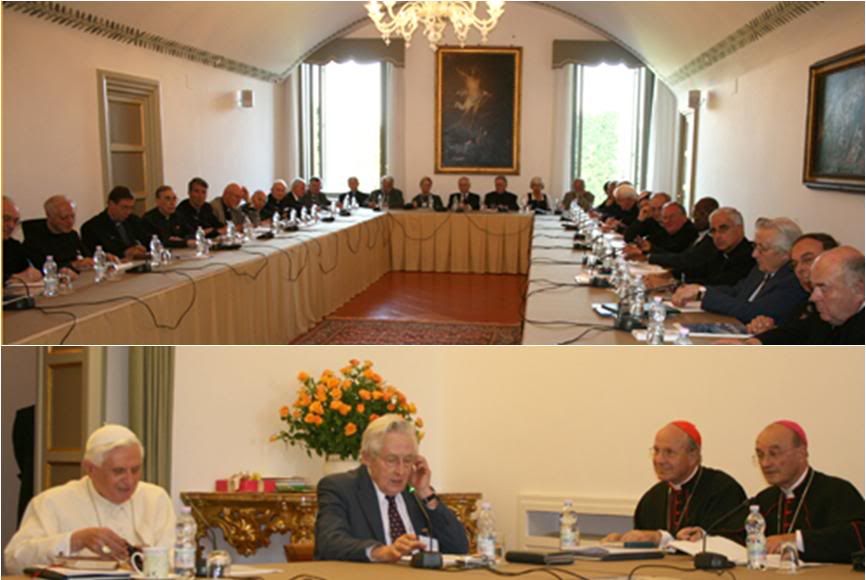 At last year's seminar.
At last year's seminar.
Pope Benedict XVI's Schuelerkreis will hold its annual reunion-seminar session this year in Castel Gandolfo on August 27-30 for the fifth year in a row.
The seminar theme this year will be mission in the ecclesial sense.
Although no further details have been given, the Pope as Cardinal Ratzinger said in a 1988 interview about missionary work: "Mission is not something inferior to contemplation, contrary to what Aristotle thought, who considered intellectual contemplation the highest on the scale of human activities. St. Thomas Aquinas said this is not a Christian concept, because the best way of living is miaxed - first, the mystic, from which comes the apostolic, in the service of the Gospel".
In another interview in 2001, Cardinal Ratzinger said: "Today, the term 'mission' is not always well understood, especially since it is often associated with the destruction of some ancient cultures by Western colonizers. But the historical reality is different.
"We know that Christian missionaries - in Africa, Asia and even in Latin America - were often the true defenders of human dignity. These missionaries saved a great part of the ancient cultures they encounterd by transcribing the indigenous languages and compiling their corresponding dictionaries and grammars. [This is very true in the Philippines, where the Spanish missionaries managed to do just that with majority of the country's 90 distinct regional languages [not dialects)].
"The missionaries were a significant part of the great revolution which was the encounter of Europe with these peoples, integrating their traditions with the Christian faith.
"Some problems in Africa today, result from the fact that Western rationalism helped destroy ancient moral forces and values without offering a replacement. On the contracy, along with techonology, the West also brought in weaponry and fomented internal wars.
"It is a fact that Christian missions can and do defend the edification of modern societies that are anchored in their own roots."
In previous years, the Schuelerkreis seminar themes were Islam, creation and evolution for two years, and last year, the passion of Jesus in Scriptures.
The Schuelerkreis is composed of 30-40 theologians and professors who acquired their doctorates under the guidance of then Prof. Ratzinger in the universities of Bonn, Munster, Tuebingen adn Regensburg.
Last year, they were joined for the first time by 17 graduate students who are acquiring their theology doctorates or preparing for Habilitation with dissertations on Joseph Ratzinger's theology. The group is called the 'new Schuelerkreis'.
They held their own independent first meeting in Fulda, Germany, last April, and will also be attending this year's Castel Gandolfo seminar.
The following is supplemental material I put together from the website of the Foundation:
www.ratzinger-papst-benedikt-stiftung.de/index.html

Last November, the Schuelerkreis incorporated itself as the Joseph Ratzinger-Benedict XVI Foundation based in Munich.
The Foundation has the following objectives:
1. To promote theology in the spirit of Joseph Ratzinger/Benedict XVU through guest professorships and scholarships for young theologians in Bible studies, patristics and fundametnal theology.
2. Research and dissemination of his theology through symposiums, seminars, ad other presentations of his thought and spirituality.
3. Custody of his scholarly work and his spiritual legacy through centers of documentation and study.
4. Presenting his thought and spirituality to the general public through modern communications media and information technology.

The Foundation also publishes books in German. Among its title so far, from left (using the English titles):
- Creation and Evolution, the papers of the 2007 Schuelerkreis seminar;
- Benedict XVI: Conscience of our Time, by Fr. Vincent Twomey, a Schuelerkreis member;
- On the Way to Jesus Christ, by Cardinal Raztinger;
- Pilgrim Fellowship of Faith: The Church as Communion, the 75th birthday tribute by his friends and colleagues;
- Tu es Pastor ovium [You are the pastor of the flock], published by the Benedict XVI Philosophical-Theological University of Heligenkreuz, Austria, following Pope Benedict's 2007 visit; and
- Symphony of Faith, a dialog between young Munich theologians and Pope Benedict XVI, 2007.
Other pictures of the 2008 Schuelerkreis reunion from the Stiftung site:
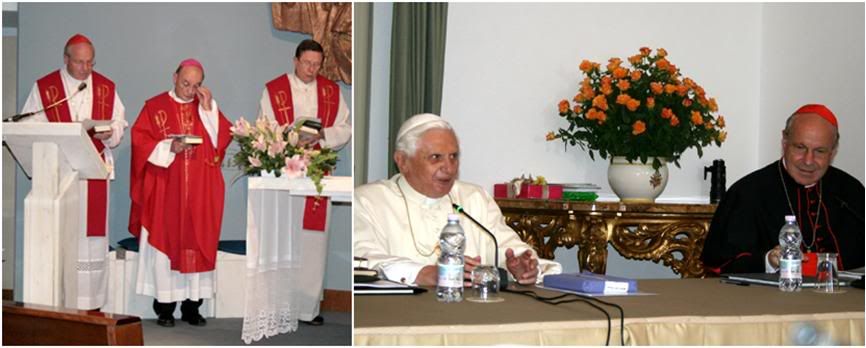
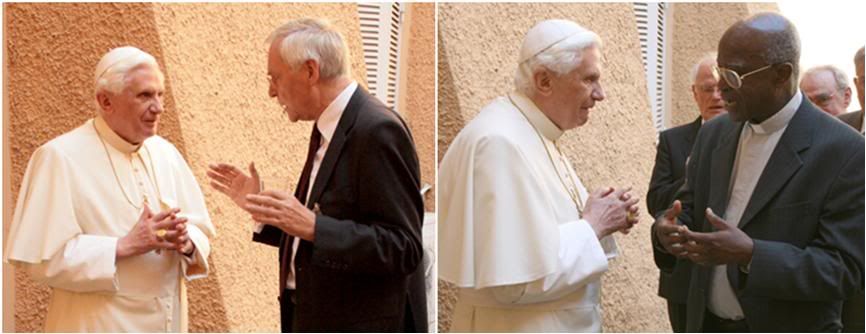 The Schuelerkreis attend the Pope's Angelus
The Schuelerkreis attend the Pope's Angelus.
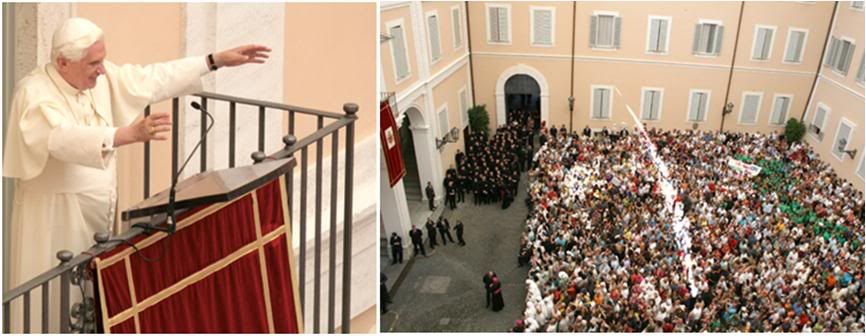
 Members of the 'new Schuelerkreis':
Members of the 'new Schuelerkreis':
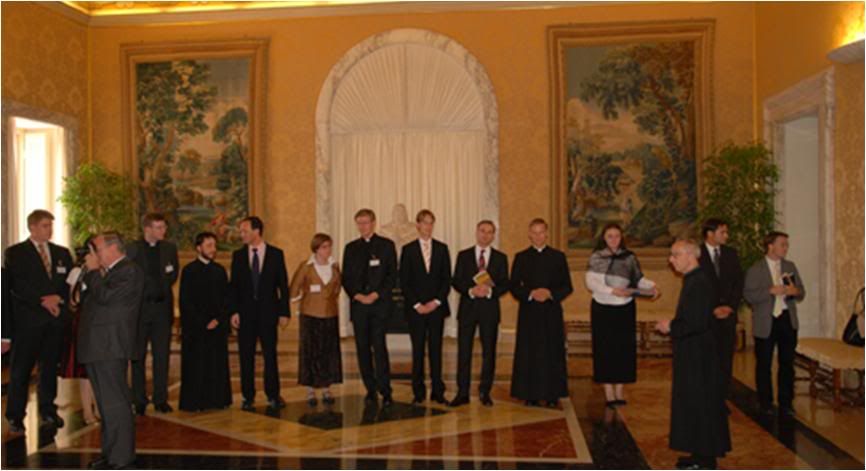 'Class' pictures of 2008:
'Class' pictures of 2008:

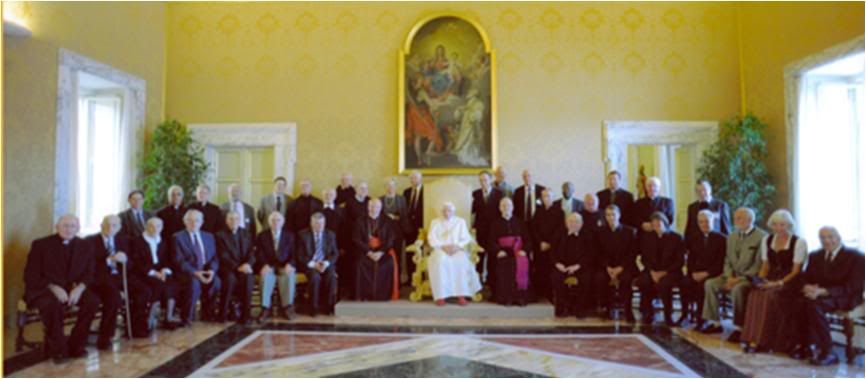 The closing Mass.
The closing Mass.
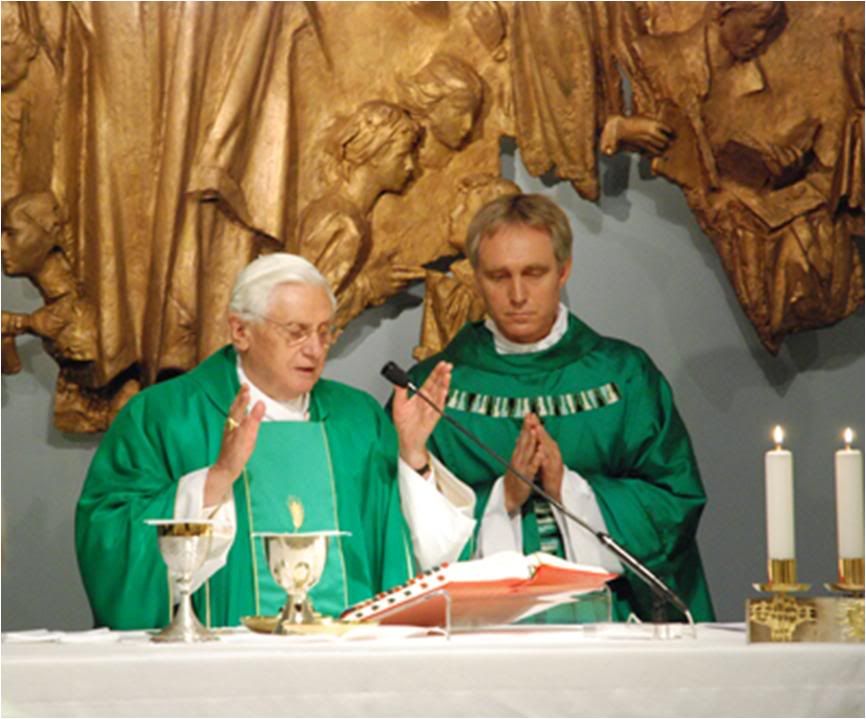
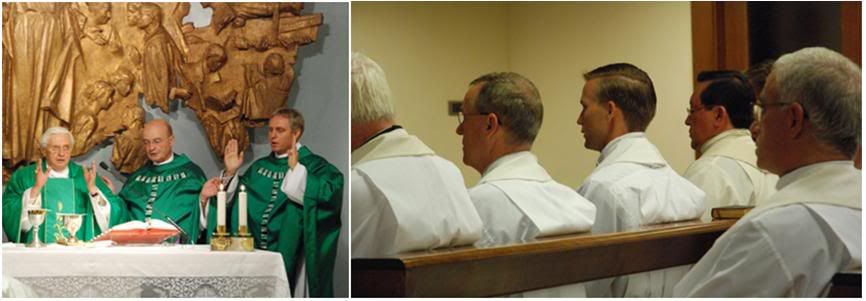
[Modificato da TERESA BENEDETTA 14/09/2009 21:04] |
| |
 12/08/2009 12:43 12/08/2009 12:43 |
|
| | | OFFLINE | | Post: 18.150
Post: 809 | Registrato il: 28/08/2005
Registrato il: 20/01/2009 | Administratore | Utente Senior | |
|

 For this item, thanks to Lella and her blog
For this item, thanks to Lella and her blog
 Tentative program for Pope's visit
Tentative program for Pope's visit
to Brescia on November 8
by MASSIMO TEDESCHI
Translated from

August 11, 2009
The Holy Father's visit to Brescia on November 8 is shaping up and appears to include the following:
A visit to the memorial in the central Piazza della Loggia to the eight persons killed and 94 injured by a bomb that went off during a demonstration in May 1984. Members of a neo-fascist group along with high-ranking members of the local carabinieri were later tried for the crime.
A Mass at the Piazza Paolo VI.
A meeting with the faithful of Concesio, the suburban town where Paul VI was born.
Inaugurating the new headquarters of the Istituto Paolo VI located next to the Montini family home. Here, he is expected to make a major address on the life and work of Papa Montini.
It is also thought he may make a stop in the morning at Botticino, another Brescia suburb, to pay homage to St. Arcangelo Tadini, one of the saints he canonized last April.
Tadini (1846-1912) was a model parish priest who tirelesssly promoted the sacraments and the liturgy, but also, at the time of the Industrial Revolution, worked actively in behalf of workers and their families and founded the order of the Workers' Sisters of the Holy House of Nazareth.
The program will be finalized after an on-site visit expected in the next several days by Vatican security and representatives of the Pontifical Household.
Brescia mobilized twice before for a pastoral visit by John Paul II - in September 1982 and again in September 1998.
In announcing Benedict XVI's visit last April, Bishop Luciano Monari said: "The reason for this visit is the 30th anniversary of the death of Paul VI. [One year late, because last August 6 was the 31st anniversary.] Papa Ratzinger was made a cardinal by Paul VI and has always shown great love and appreciation for our Brescian Pope. So he will come and share with us a day which shall be one of great communion and prayer".
The Pope will be arriving at Ghedi airport around 9 a.m., and it is during the trip from the airport to the center of Brescia that he may make the stop at Botticino to venerate St. Arcangelo Tadini.
In this case, he would meet the faithful briefly at the central square which is surrounded by all the principal places in which the saint carried out his pastoral work and apostolate.
[Modificato da TERESA BENEDETTA 12/08/2009 12:44] |
| |
 12/08/2009 13:40 12/08/2009 13:40 |
|
| | | OFFLINE | | Post: 18.151
Post: 810 | Registrato il: 28/08/2005
Registrato il: 20/01/2009 | Administratore | Utente Senior | |
|

Wednesday, August 12
 ST. LOUIS OF TOULOUSE, Bishop (France, 1274-1297)
ST. LOUIS OF TOULOUSE, Bishop (France, 1274-1297)
[San Luis Obispo - Spanish for St. Louis, Bishop]
OR today.
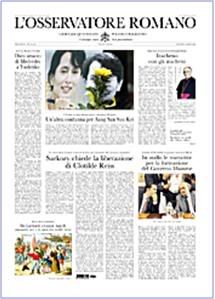 No papal news in this issue. Page 1 stories: European Union announces new sanctions
No papal news in this issue. Page 1 stories: European Union announces new sanctions
against Myanmar after new verdict against Aung San Suu Kyi; Russian president
launches fierce new attack against Ukraine's Yushchenko; negotiations stalled on
forming a new Lebanese government; France's President calls on Iran to release
French teacher arrested for 'crimes against national security' for documenting
recent protest demonstrations; and an interview about Iraq with Mons. Fernando
Filoni, outgoing deputy Secretary of State who used to be the Nuncio to Iraq.
THE POPE'S DAY
General Audience today - Three days before the Feast of the Assumption,
the Holy Father's catechesis was focused on Mary as the Mother of
Priests in the context of the Year for Priests.
[Modificato da TERESA BENEDETTA 12/08/2009 14:21] |
| |
 12/08/2009 14:20 12/08/2009 14:20 |
|
| | | OFFLINE | | Post: 18.152
Post: 811 | Registrato il: 28/08/2005
Registrato il: 20/01/2009 | Administratore | Utente Senior | |
|
 GENERAL AUDIENCE TODAY
GENERAL AUDIENCE TODAY
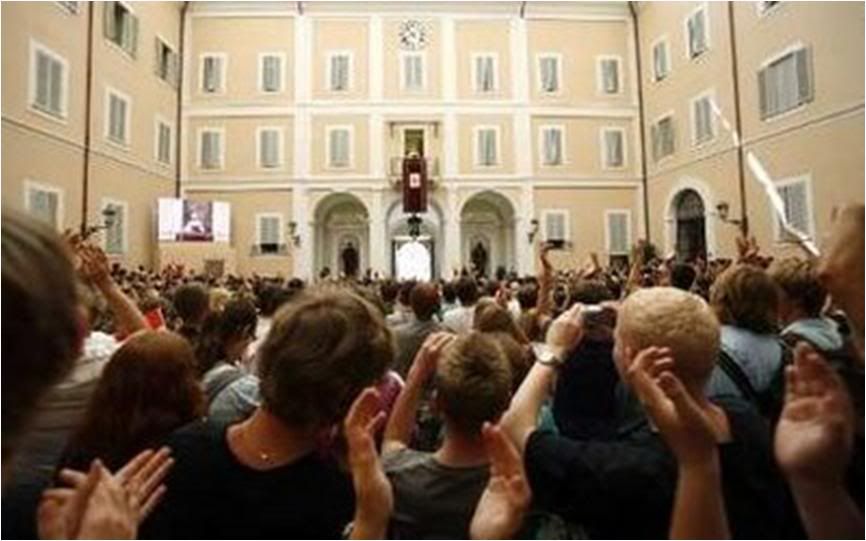
The Holy Father's catechesis today was on Mary as the Mother of Priests, in the context of the Feast of the Assumption on Saturday and the current Year for Priests.
In his greetings to the faithful, he expressed his sorrow and prayers for the victims of the devastating typhoon that hit Taiwan, the Philippines, southeast China and Japan.
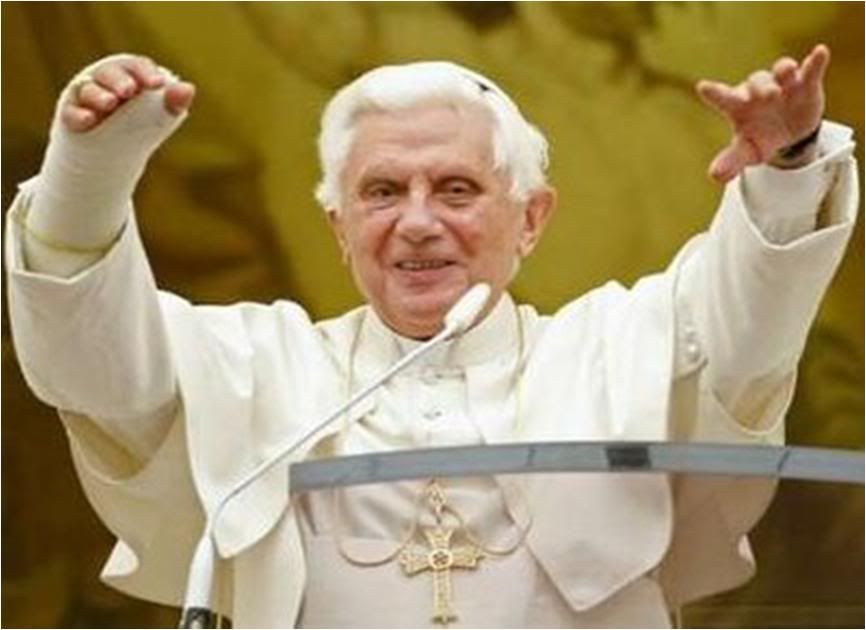
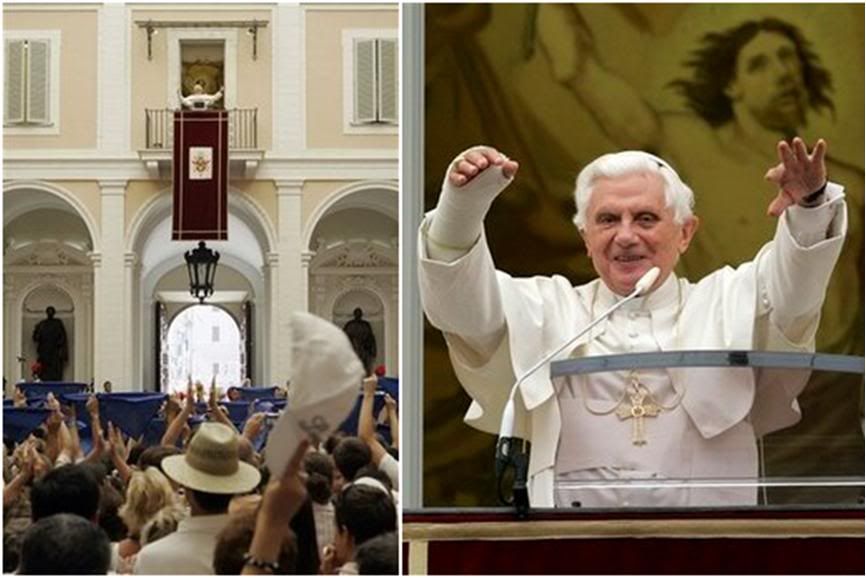 Here is a translation of the Holy Father's catechesis:
Here is a translation of the Holy Father's catechesis:
Dear brothers and sisters,
The celebration of the solemnity of the Assumption of the Blessed Virgin on Saturday is imminent, and we are in the midst of the year for Priests. Thus, I would like to speak on the nexus between Our Lady and the priesthood.
It is a bond that is profoundly rooted in the mystery of the Incarnation. When God decided to become man in his Son, he needed the free YES of one of his human creatures. God never acts against our freedom.
So something truly extraordinary happened: God became dependent on the freedom to say Yes by one of his creatures: he was waiting on this Yes.
St. Bernard Clairvaux, in one of his homilies, explained dramatically this decisive moment in universal history, when heaven, earth and God awaited what this creature would say.
Maria's Yes therefore was the door through which God could enter the world and become man. Thus Mary is really and profoundly involved in the mystery of the Incarnation, of our salvation.
And the Incarnation, the Son becoming man, was from the beginning aimed at his self-giving - giving himself with much love on the Cross, to become bread for the life of the world. Thus, sacrifice, priesthood and the Incarnation go together, and Mary is at the center of this mystery.
Let us go to the Cross. Jesus, before dying, saw his Mother at the foot of the Cross, and he saw a beloved son. This beloved son was certainly a very important individual, but so much more: he was an example, a prefiguration of all beloved disciples, of all persons called by the Lord to be his 'beloved disciple', and consequently, in a special way, of all priests.
Jesus says to Mary: "Mother, behold your son" (Jn 19,26). It was a kind of testament: he entrusts his mother to the care of the son, the disciple.
But he also tells the disciple: "Behold your Mother" (JJn 19,27). The Gospel tells us that from this moment, St. John, the beloved disciple, took Mary "into his own home". Thus it is in the Italian translation.
But the Greek text is much more profound, much richer. And we can translate it as: He took Mary into the intimacy of his life, of his being, «eis tà ìdia», into the profundity of his being.
To take in Mary meant to introduce her into the dynamism of his entire eistence - not as an ezternal thing - and into everything that constituted the horizon of his own apostolate.
I think it is therefore understandable how the special relationship of motherhood between Mary and priests constitutes the primary source, the fundamental reason for the favor that she reserves for each priest.
Mary favors them for two reasons: because they are most like Jesus, the supreme love of her heart, and because they, like she, are committed to the mission of proclaiming, witnessing and giving Christ to the world.
For his own identification with and sacramental conformation to Jesus, Son of God and son of Mary, every priest can and should feel himself to be a truly beloved child of this most elevated and humblest of Mothers.
The Second Vatican Council invites priests to look at Mary as the perfect model for their own existence, invoking her as "Mother of the Supreme and Eternal Priest, Queen of the Apostles, Help of all Priests in their ministry". Priests, the Council says, "should therefore venerate and love her with devotion and filial worship" (cfr. Presbyterorum ordinis, 18).
The Holy Cure of Ars, whom we particularly commemorate this year, loved to say: "Jesus Christ, after having given us everything that he could possibly give, also wanted us to be heirs to what he held most precious, that is to say, his own Holy Mother" (B. Nodet, Il pensiero e l’anima del Curato d’Ars, Torino 1967, p. 305).
This is true for every Christian, for all of us, but especially so, for priests. Dear brothers and sisters, let us pray that Mary may make all priests, in the face of all the problems of the world today, conform to the image of her son Jesus as dispensers of the inestimable treasure of his love as the Good Shepherd.
Mary, Mother of Priests, pray for us!
In English, he said:
I offer a warm welcome to the English-speaking visitors present at today’s Audience, including the Sisters of Saint Anne, the altar servers from Malta, and the pilgrims from Australia and the United States of America.
As the Feast of the Assumption of the Blessed Virgin draws near in this Year of the Priest, my catechesis today is centered on Mary the Mother of priests. She looks upon them with special affection as her sons.
Indeed, their mission is similar to hers; priests are called to bring forth Christ’s saving love into the world. On the cross, Jesus invites all believers, especially his closest disciples, to love and venerate Mary as their mother.
Let us pray that all priests will make a special place for the Blessed Virgin in their lives, and seek her assistance daily as they bear witness to the Gospel of Jesus. Upon you and your families I invoke God’s blessings of joy and peace!
At the end of his plurilingual greetings, he said:
Finally, my thoughts go to the various populations who in the past several days have been struck by a violent typhoon in the Philippines, Taiwan, some provinces in the southeastern part of the People's Republic of China, and Japan, which has also been hit by a strong earthquake.
I wish to manifest my spiritual closeness to all those who are in conditions of great diffiiculty and I ask evereyone to pray for them and for those who have lost their lives.
I hope that there will be no lack of comfort from solidarity and the relief of material assistance.

[Modificato da TERESA BENEDETTA 12/08/2009 15:20] |
| |
 12/08/2009 16:16 12/08/2009 16:16 |
|
| | | OFFLINE | | Post: 18.154
Post: 812 | Registrato il: 28/08/2005
Registrato il: 20/01/2009 | Administratore | Utente Senior | |
|
 Benefan posted this item in the PRF yesterday. It's an excellent commentary and one that needed to be spelled out the way the writer does here.
Benefan posted this item in the PRF yesterday. It's an excellent commentary and one that needed to be spelled out the way the writer does here.
It's remarkable that it takes an undergraduate at Notre Dame to articulate the obvious about the frantic spin among Obama Catholics - which I think includes the universe of all US liberal Catholics - to show that the Holy Father does not 'mind' Obama's pro-abortion positions as much as orthodox American Catholics, including at least 80 bishops, do! Even despite the Pope's gesture, underscored in as many ways as the Vatican could, of giving Obama a copy of Dignitatis Personae.
Re-inventing Popes
By John Gerardi

August 10, 2009
John Gerardi, an undergraduate at Notre Dame, is a regular contributor to The D.C. Writeup.
Liberal American Catholics love to re-invent dead Popes.
When John Paul II was alive, liberal Catholics ignored his teaching on a whole host of issues, from the all-male priesthood to liberation theology.
But after Pope Benedict XVI’s election, they have attempted to contrast the suddenly “moderate” and “beloved” John Paul with his “conservative” and “hard-line” successor.
John Paul is not the only one to be subject to this historical revisionism. Almost every Pope from Leo XIII to Paul VI has been recast to appear more or less liberal or conservative than he really was, so as to fit some leftist template of “liberal = good, traditionalist = bad.”
The principle is simple: Liberals despise Popes who oppose them and pretend to like Popes whom they can portray as supporting their agenda.
Liberal Catholics are now (at least momentarily) changing their tune on Pope Benedict to justify their support for the fiercely pro-choice Barack Obama.
Though Joseph Ratzinger was derided before and after his election with such epithets as “God’s Rottweiler,” “the Grand Inquisitor,” and “a Nazi” (no joke), his meeting with President Obama this month, along with his new encyclical Caritas in Veritate, are being hailed by the left as proof that the Church is over her silly fixation on abortion, and is now equally concerned with peace, “social justice™,” universal government health care, rainbows, ponies, and the Socialist Utopia.
Some context for those who don’t know what’s going on with the Catholic Church in America would be useful.
The Church in the U.S. has been rocked by two closely-related events: the 2008 election and the University of Notre Dame’s 2009 commencement address by President Obama.
An emerging new Catholic Left, led by such thinkers as U.S. Ambassador to Malta Doug Kmiec and such groups as Catholics in Alliance for the Common Good, put forward a significant case in favor of supporting Obama’s candidacy in 2008.
They based their support in Obama’s commitment to bringing about peace in Iraq [as if George W. Bush had not already laid down the indispensable groundwork for that with he surge that Obama and his fellow Democrats had derided!] , protecting the environment, providing health care for the uninsured, and reducing abortions by improving the social conditions of the usually-poor women who choose it.
As great as that all sounds, more traditional and conservative Catholics attempted to point out two inconvenient facts. First, these goals expressed by Obama as priorities for his presidency were also shared by John McCain. The two differed in terms of how to accomplish them, but, though the Catholic Left acted like Obama had the Catholic market cornered on these issues, McCain’s approaches to them were not inherently immoral or opposed to Church teaching.
Secondly, Obama (unlike McCain) wholeheartedly endorses the legal status of on-demand abortion, federal funding for embryo-destructive stem cell research, repealing the Mexico City Policy to allow federal funding for abortion overseas, a publicly-funded health care plan that covers abortions, and appointing Supreme Court justices who will protect Roe v. Wade. Oops.
Many American bishops, led by Archbishop Charles Chaput of Denver, were forceful in asserting to their flocks the logical priority that Catholics had to give to the abortion question in their vote.
For these same reasons, approximately eighty American bishops publicly opposed the decision of the University of Notre Dame to honor President Obama by naming him their 2009 commencement speaker and by giving an honorary doctorate.
The bishops thought it was scandalous for a Catholic school to honor someone whose positions and actions are antithetical to the most important social issue the Church faces today.
Liberal Catholics howled in protest to the bishops, saying that the Church needs to engage the broader culture (by kissing its ass, apparently) and accusing bishops of wanting to put us back into the “Catholic ghetto.”
So, you can see that the Catholic Left position, under assault from the hierarchy, really could use a bit of magisterial help. Well, along came two P.R. godsends from no less authority than the Pope himself.
First, President Obama met the Pope for the first time on July 17 at the Vatican. With their uncanny gift for ignoring important distinctions, liberals gleefully shrieked, “See! See! The Pope met with him, that must mean the American bishops are just a bunch of reactionary partisan frauds!”
Of course, the Pope just met and talked with Obama, as he meets and talks with almost every world leader with whom he has diplomatic relations. He did not render Obama any conspicuous honors or hold him up as someone to model — as Notre Dame did.
Secondly, the Pope’s magnificent teaching letter (or “encyclical”), Caritas in Veritate, was publicly released on July 7. The encyclical was broad, providing a summary of a huge swathe of the Church’s social doctrine, including certain more particular comments about the recent financial crisis.
Statements indicating the importance of protecting the environment, of the rights of workers to unionize, of rejecting motives of excessive greed in business, of preserving some social welfare programs, and one particular paragraph that seemed to recommend an expanded role to the United Nations were hailed by liberals as a sign that the Pope was now a progressive who joins them in an utter rejection of capitalism.
However, none of these “liberal” ideas were exactly new sentiments coming from the Papacy, and I don’t think I can find many conservatives who would object in principle to anything the Pope suggested.
As for his statement on the United Nations (the one novelty in the document), who would oppose giving the UN authority over some limited aspects of international trade, so long as it were first reformed so as “to be regulated by law, to observe consistently the principles of subsidiarity and solidarity, to seek to establish the common good, and to make a commitment to securing authentic integral human development inspired by the values of charity in truth,” as the Pope stated?
And, by the way, what is “authentic integral human development” in the Pope’s mind? He said earlier in the encyclical, “Openness to life is at the centre of true development.” He decried the spread of abortion, euthanasia, and the sterilization of women in developing countries, specifically criticizing the NGOs that provide these services to women (CoughMexicoCityPolicyCough!).
It is clear that defending the dignity of human life is the central, foundational concern of the Pope in this encyclical, and that it is at the heart of the Church’s social teaching in the modern era.
And this is the problem with the Catholic Left. They care about abortion, but apparently not enough to, you know, try to make it illegal or anything.
Maybe they should try to take in the words Benedict quotes from John Paul II’s Evangelium Vitae: “…a society lacks solid foundations when, on the one hand, it asserts values such as the dignity of the person, justice and peace, but then, on the other hand, radically acts to the contrary by allowing or tolerating a variety of ways in which human life is devalued and violated, especially where it is weak or marginalized.”
[Modificato da TERESA BENEDETTA 16/08/2009 01:57] |
| |
 12/08/2009 16:43 12/08/2009 16:43 |
|
| | | OFFLINE | | Post: 18.155
Post: 813 | Registrato il: 28/08/2005
Registrato il: 20/01/2009 | Administratore | Utente Senior | |
|

 Cardinal Pell draws parallels between
Cardinal Pell draws parallels between
Cardinal Newman and Benedict XVI
on conscience and relativism
www.newmancause.co.uk/
August 11, 2009
 Cardinal Pell at the Brompton Oratory this week.
Cardinal Pell at the Brompton Oratory this week.
On the anniversary of Cardinal Newman’s death, Cardinal George Pell of Sydney has commented incisively on Newman’s significance and impending beatification.
Aligning Newman with Pope Benedict XVI’s analysis of ‘the dictatorship of relativism’, Pell emphasises that Newman’s understanding of conscience is in ‘the mainline of the Christian tradition, which upholds the view that we do not create truth but stand underneath it.’ Even conscience, therefore, must be ‘judged by conformity to the truth, and to the Word of God.’
As Newman’s Letter to the Duke of Norfolk declares, conscience is in fact fulfilled and completed only when it embraces the Faith and Morals taught by the Catholic Church.
Detached from this vocation to objective truth, Newman knows that conscience degenerates from discerning what is right into ‘the right of self will’. From this flows ‘the dictatorship of relativism’, according to which truth is sacrificed to human passions and opinion.
Contemporary emphasis on the primacy of conscience, which often appeals to Newman’s inspiration, systematically overlooks this aspect of his teaching, according to Pell.
For Newman it is in fact ‘truth, specified as the word of God, that has primacy.’ Without this, what people call ‘conscience’ becomes in Newman’s account a ‘counterfeit’.
Pell suggests that the relativism promoted by ‘counterfeit’ conscience leads inexorably to ‘the dictatorship of numbers, power and manipulation’.
When everyone’s ‘conscience’ is supposed to be ‘equally valid’, it is unavoidably those most determined and best-placed to assert themselves whose opinions hold sway.
Drawing on another connection between Newman’s thought and Pope Benedict’s, Cardinal Pell argues that Christian Faith has from the beginning presented itself above all as true.
In this it crucially separates itself from what Pell calls ‘mythical’ conceptions of religion. Such conceptions of religion are ‘used to justify political and social arrangements — as today religion is said to perform an important therapeutic function — but do not claim that religion belongs to the order of reality as such.’
For Newman, however, Christianity cannot be aligned with other religions and reduced to an instrument of social cohesion. Its claim to truth makes it permanently resistant to the State’s recurring efforts to subdue and control it.
In his ‘very specifically Christocentric and God-centred understanding of conscience’, so also in his insistence on Christianity’s claim to truth, Pell argues that Newman can refresh the Church’s opposition to the tyranny exercised by secular ’science’ and power.
‘Knowledge which radically excludes the transcendent dimension of life’, writes Pell, ‘has partly blinded itself. The diminishment of knowledge without faith is one reason why Newman insisted that although the value of knowledge is absolute, knowledge itself is “emphatically not the highest good”’.
Pell reminds us that Newman’s witness to this truth has the most urgent significance for our own time, when ‘the humanity of the unborn child, the humanity of the old, disabled and sick, and the wrongness of unjust working conditions’ are threatened by the dictatorship of professional expertise divorced from the light of Faith.
For all these reasons, writes Cardinal Pell, Newman’s beatification provides ‘a powerful spiritual help as we strive to respond to some of the most important and damaging intellectual errors of our age.’
NB: The site has now published the full text of Cardinal Pell's statement on the coming beatification of Cardinal Newman. I will post it later.
|
| |
 12/08/2009 20:10 12/08/2009 20:10 |
|
| | | OFFLINE | | Post: 18.156
Post: 814 | Registrato il: 28/08/2005
Registrato il: 20/01/2009 | Administratore | Utente Senior | |
|
 The following was a strange headline to find in the London Times online, especially with Ruth Gledhill's byline. But one must thank Gledhill for having the journalistic good sense to give over her blog today to a conservative Catholic blogger, Chris Gillibrand of Catholic Conservation.
The following was a strange headline to find in the London Times online, especially with Ruth Gledhill's byline. But one must thank Gledhill for having the journalistic good sense to give over her blog today to a conservative Catholic blogger, Chris Gillibrand of Catholic Conservation.
Gillibrand gives one of the best layman's presentations so far of the status ecclesiam two years since Summorum Pontificum which also answers the now infamous gloating - and unfairly misrepresentative - editorial by the ultra-liberal British Catholic magazine The Tablet [as odious to orthodox Catholics as National Catholic Reporter in the US is) - which deliberately cherry-picks a recent letter by the new Archbishop of Westminster to make it appear that he is hostile to Summorum Pontificum.
Benedict XVI brings order
out of 'liturgical chaos'
From the blog
by RUTH GLEDHILL

August 12, 2009
Recently, as Christopher Lamb reported for The Tablet, the Archbishop of Westminster Vincent Nichols warned traditionalists that if they denigrate the ordinary form of the Mass, they risk alienating themselves from the Roman Catholic Church.
His message was sent to the Latin Mass Society as it prepares for the latest in its increasingly successful series of conferences to train priests in how to celebrate correctly the Tridentine Rite, or the usus antiquior as they refer to it. [Archbishop Nichols's complete letter is available online.]
The warning won him warm praise from The Tablet: 'Thus has Archbishop Nichols neatly answered virtually every objection to the motu proprio, and the Tridentine Rite can henceforth take its proper – and necessarily marginal – place in the life of the Catholic Church.'
The leader in The Tablet, the leading journal to speak for, and to, mainstream British Catholics [Then that's a mainstream I would steer clear from! and God help the British] continues: 'Indeed, he has made it accessible to those who are fully committed to Vatican II. This timely display of clear leadership from the new president of the Catholic Bishops’ Conference of England and Wales bodes well.'
...I am perhaps not always the best qualified to comment on the more arcane matters of 'old' Catholic liturgy. So I have invited CathCon's Chris Gillibrand to write a response, confident of his extraordinary expertise and understanding in these matters. Chris writes:
'Within the household of the Catholic Faith, only a liberal Catholic newspaper could regard as controversial the words and intention in the Motu Proprio, Summorum Pontificum, issued the Vicar of Christ on earth, Pope Benedict XVI. The document provides freedom to the Latin Mass.
One has to be amused also by the Tablet praising the firm hand (as they perceive it) of ecclesiastical authority from Archbishop Nichols. Hopefully, their friends on the left will be as submissive to Episcopal authority as they wish their enemies on the right to be.
The impression is often given that the traditionalists are the last group of faithful over which the bishops have any influence. And let us be clear, the Motu Proprio does not “appear” to allow priests to opt for the Latin Mass, it does.
Bishops have been as ingenious in frustrating the will of the Pope, as the Tablet would wish them to be - Bishops’ Conferences which have no juridical status issuing guidelines for its implementation.
The need for a stable group was interpreted by one German bishop as requiring the studying of identity cards before the Mass to make sure everyone came from the immediate area!
Much more controversial is the Tablet’s assertion that the new Mass “reflects the reforms of the Second Vatican Council” (attending Mass at the London Oratory and the Catholic Sanctuary by the great traditionalist Catholic author Michael Davies will soon correct this view) - NO! Rather this Mass [the Novus Ordo] is a reflection of the committee decisions that constructed it in the post-conciliar era.
This is the first approved liturgy of the Catholic Church to be so constructed and, God willing, the last. It would, however, be imprecise to call this liturgy a rite in any sense known to history, given the diverse manners of celebration, both in terms of form and content.
A rite needs unity of form, at least. Thousands, upon thousands, of authorised permutations for celebrating Mass exist, which becomes an unknowable number, possibly approaching infinite, when all the variations that exist that have never been authorised are taken into account. These variations are in the hands, at best, of the parish priest, and, at worst, a parochial liturgical committee.
One is reminded of the liturgical chaos prior to the Council of Trent, which ruled that all liturgical uses not older than two hundred years should be suppressed. In our own days, fifty years would suffice.
If we accept the argument that personal preference should play no role in liturgy, it is time to close down every liturgical committee in the land, and produce proper rubrics for the new Mass, so that its dignity of celebration can approach that of the Latin Mass.
Active participation, after the Second Vatican Council, has in effect meant the “active participation” of a pseudo-clerical lay elite in the power structures of parish and diocese.
One only has, as a server, to compare the view of the congregations at an ordinary form and an extraordinary form of the Mass to realise that the Latin Mass wins every time for participation levels - devout following of the Latin Mass in hand Missals, compared to the boredom and alienation on the faces of those who assist at the new Mass.
“Help, I am a Catholic, get me out of here”, they seem to be saying. And this is reflected on the face of the priest, who faces the people in the new Mass.
In contrast, at the Latin Mass the congregation are not spectators of what the priest is doing, or the rest of the congregation but of the divine presence.
I took a learned Methodist friend to Mass once and he was worried about sitting in the front row, because “we’d be seen”. I immediately assured him that the last people that would concern the congregation would be us, rather they would be worshipping Christ in the Blessed Sacrament as they would honour a king.
Indeed, if active participation really has been a fruit of the Council, then there would have been an increased belief among Catholics in the Real Presence of Christ as a result. The reverse has occurred.
Laying aside their devotions to saints, specific aspects of the life and Passion of Jesus and the angels (all so enriched by indulgences), the laity have been told they should now make their Eucharistic life, Christo-centric (as if it was not before).
Whenever anyone demands a Christo-centric liturgy, they really want a self-referential liturgy, either to themselves, or the “gathered community” or both. The Mass text in English (and almost all other languages) has mistranslated the Gospel words of Jesus used in the consecration, “pro multis”, which should be “for many” as “for all”, from which it is but a short step to the sentimental but erroneous belief that each and every one of us is directly destined for heaven: i.e., that what we do in the course of this earthly life is irrelevant and the application of the fruits of the Mass to our eternal destiny is unnecessary.
Is it any wonder that people think that Mass is a waste of time and want to go home?- regularity of practice dropping off, leading to lapsation. More liberal Catholics call the exclusive use of male altar servers discrimination, using secular rather than religious categories.
Given that women cannot and will never be ordained to the priesthood, one should remember that male servers were a great reservoir from which priestly vocations were developed, as the young servers modelled themselves on the glories of the priesthood. Rather today, given that girls mature rather more quickly than boys, the boys are just chased away.
One only has to look at the photographs of the serving teams in parishes, which are even more dominated by females than the European Commission recruitment. It all makes for a good, bourgeois image of Catholic life, but not for vocations. Besides, it is insulting to girl servers to encourage them in the belief that they might one day be priests. They won’t, and often will lapse.
Traditional Catholics are being asked to regard as equivalent the ordinary and extraordinary forms. For the forty years after the Council, the Latin Mass may as well have been invalid given the strict conditions imposed on it, and in book after book, calumnies were heaped on it pointing out its supposed deficiencies.
The most anyone can expect in the circumstances is for traditional Catholics to tolerate the new Mass, now that the Pope has given priests the right (effectively given them back something that they already possess) to celebrate the Latin Mass.
What an odious age we live in when the Catholic Church proposes for liturgical use a Mass which is putatively invalid, either in the intrinsic or extrinsic sense. Invalidity is something that Anglicans luxuriate in, not the inheritance of Catholics.
The Chadwick resignation letter imputes to the members of the Latin Mass Society (which he was meant to be leading) views that they do not hold. The wilder shores (well beyond the LMS) of sede-vacantism (there is no Pope occupying the throne of St Peter) have to be reached before encountering the absolute belief in the invalidity of the new Mass.
The greatest indicator of intrinsic invalidity would be if erroneous belief were to be propagated by the Mass and good candidates for this would not only be the universal salvation referred to earlier but also the idea that the Mass was no longer before everything a sacrifice, identical with that on Calvary save that it is unbloody.
The idea of the Mass as a heavenly banquet comes after that of sacrifice, and it expresses participation in the act. The sacrificial character of the Mass was only saved by the merest whisker in the post-conciliar era - approximating to Protestant forms being considered more important than truth. [Why, oh why, did Paul VI give in to Bugnini et al????]
And extrinsically, while St Thomas Aquinas provided the broadest possible terms for the validity of a Mass (other authorities are stricter), a priest not intending to offer sacrifice would render a Mass invalid and their are plenty of priests who can be suspected of this in Europe.
Is sacrifice intended in this ideal of a Mass for the holidays proposed by the German Bishops Conference? [This refers to an outrageous article with a picture in the German conference site dedicated to the Year for Priests. The article is entitled "In order that dormant areas of (one's) life may breathe again..."

in which a priest writes that the Mass should be adapted for the convenience of people on vacation who really should not be distracted from their vacation. I was going to do a post about it in the CHURCH&VATICAN thread, but I came across the Gledhill blog, so I might as well use it here. The disposable plasticware were meant to be the Mass vessels!
Tthe fact that the German bishops' conference site would publish such an article at all - in its webpage for the YEAR FOR PRIESTS, yet! - is emblematic of how far out, to say the least, the German Church can be. It gives me the shivers! Think what it means to Joseph Ratzinger, priest, German and Pope!]
I used to hold what I now consider to have been a naive view of the equivalence of the ordinary and extraordinary forms of the Mass, until I started travelling on the continent. My experiences of the all-embracing liturgical decadence are detailed on my blog for those that are interested.
Ordinary and extraordinary are not equivalent. While many confuse deficiency and invalidity, deficient is definitely the name for the ordinary form.
The validity of the new Mass is saved not by intrinsic considerations (wayward priests beside) but by ecclesiological considerations by which salvation is offered by Christ and His Church to as many souls as possible in this world, as by divine intent: the Catholic Church is the unique vessel of salvation.
So while the ordinary and extraordinary forms of Mass are both valid, no one could sustainably accuse the Latin Mass of being invalid. Both the extraordinary and ordinary forms are liturgies of the Bishop of Rome.
It is now time for the Pope to celebrate the Latin Mass publically to prove the point. [This is a maddening conundrum I have been puzzled about from the very beginning, and I can find no explanation of why Benedict XVI has not yet celebrated it in public as Pope.]
The extraordinary form is the highest expression of human civilisation throughout the ages, whether or not one is a Catholic. It is in the most profound sense the ordinary form - it is extraordinary that what should be the extraordinary form bears the name ordinary and vice versa. Time will surely correct these misnomers.
The Latin Mass is the measure of all Catholic life, the new Mass on the one hand and all the protestant liturgies together, being mere abstractions from it.
The liberation of the Latin Mass by Pope Benedict is reminiscent of the Emperor Constantine permitting liberty of worship throughout the Roman Empire - after which the triumph of Catholicism was inevitable, as the Latin Mass will eventually displace the new Mass. The last barriers to this are the seminarians who studied immediately after the Council.
For them to quote Wordsworth (in his poem about the French Revolution).
"Bliss was it in that dawn to be alive,
But to be young was very heaven! - Oh! times,
In which the meagre, stale, forbidding ways
Of custom, law, and statute, took at once
The attraction of a country in romance!
When Reason seemed the most to assert her rights,
When most intent on making of herself
A prime Enchantress--to assist the work,
Which then was going forward in her name!"
In place of 'reason', perhaps, we could put 'religion'.
The next generation will take up the Benedictine gift of the Latin Mass without any psychological reservation. The statistics are prophetic. In Germany, the mainstream church which uses the new Mass will be extinct in twenty years given the year on year almost precisely linear decline in the number of Catholics since 1945.
The Second Vatican Council produced the minutest of all possible blips in the statistics - so much for the much vaunted fruits of the Council.
In other countries, where normally the Catholic Church had been going from strength to strength in the post-war years, the mainstream church going down will meet the traditional groups coming up in about fifteen years. Questions of validity of the new Mass will be irrelevan t- the new Mass will be, by that stage, marginalised and increasingly unnecessary to the life of the Church.
The rebirth of the Church will take much more than the Latin Mass, but it is the greatest of all possible beginnings. Inter alia. improved catechetics, renewed Catholic education and a re-establishment of the natural law as the centre of Catholic morals will all be needed besides.
The death of the liberal Catholic project, for which the Tablet has stood for so many years, was announced immediately under the article about the Latin Mass, with the EU sponsoring legislation which seek the submission of the Catholic conscience to the state.
All that openness has brought precisely nothing apart from the prospect of persecution or conformity. The Latin Mass bring the prospect maybe also of persecution but also of glory, and the greater glory which is yet to be revealed. The Pope, Archbishop Nichols and the Latin Mass Society understand the signs.'
Note: Ruth Gledhill would like to make it clear that publication of this article by Chris Gillibrand should not be taken to infer that she agrees with all or indeed any of the views he expresses here.
Sorry- I messed up the post 'typographically' this morning - and it's only hours much later (9:30 p.m.) that I have the chance to get back to the forum and discovery my sloppiness.
For the right perspective on this story and how it began, here is the message of Mons. Nichols:
Message from the Most Reverend Vincent Nichols
Archbishop of Westminster
I welcome this short Training Conference provided by the Diocese of Westminster in conjunction with the Latin Mass Society. This is the correct description of this event. In both the teaching and law of the Church it is the bishop who has responsibility for the provision and oversight of the Liturgy.
In the Motu Proprio Summorum Pontificum Pope Benedict permitted the use of the 1962 Form of the Mass, under clearly defined circumstances. In doing so he insisted that there is one Rite of the Mass in the Latin Church. This makes clear that the ordinary Form of the Mass and this extraordinary Form serve one and the same Rite.
They are, therefore, both finding their place in this Summer School and participants will wholeheartedly celebrate the Mass in each of these Forms. The view that the ordinary Form of the Mass, in itself, is in some way deficient finds no place here.
[The deficiencies are in the arbitary free-form ways it has been celebrated, ways that violate the essense of the Mass as a recreation of Christ's sacrifice through prescribed ritual. Rituals are not meant to be subject to infinite variations at the whim and whimsy of those involved!]
Indeed anyone who holds such a view does not come under the generous provision of Summorum Pontificum. Such a person is inexorably distancing themselves from the Church.
The Mass is the source and expression of the unity of the Church, for that unity comes from Christ. We have no other. Our unity does not consist in a uniformity of personal use or preference. Indeed, such matters should play a minimum part in our liturgy, particularly in the ministry of the priest.
What we priests are to provide, as a key element of our ministry, is the Liturgy of the Church.
The established principle of good liturgy – such as the ‘active participation’ of all taking part in the Mass, in both the Liturgy of the Word and the Liturgy of the Eucharist – apply, whichever Form of the Mass is being used.
This principle needs careful consideration and application by every celebrant and any who help in the preparation of the liturgy. I trust it will find its place in this Summer School.
Pope Benedict has given an additional and delicate task to priests and bishops: the provision of the extraordinary Form of the Mass in response to genuine needs as outlined in the Motu Proprio.
I am grateful to you all for helping us to respond to this task, always within the work of sustaining and nurturing the unity of the Church.
+Vincent Nichols
[Modificato da TERESA BENEDETTA 13/08/2009 16:02] |
| |
 12/08/2009 21:31 12/08/2009 21:31 |
|
| | | OFFLINE | Post: 166
Post: 2 | Registrato il: 28/05/2007
Registrato il: 19/02/2009 | Utente Comunità | Utente Junior | |
|
I have no words for this picture and the connected caption. Are they insane!? Who would take that Priest serious after such a thing? Who would ever go back??! S C A R Y !!!! It's almost as bad as the famous puppet 'Mass'
Mega explosion! ![[SM=g8126]](https://im0.freeforumzone.it/up/0/26/3169140.gif) This one is also appropriate: This one is also appropriate: ![[SM=g8143]](https://im0.freeforumzone.it/up/0/43/2353327.gif)
I can't wait for Archbp. Marx of München and Freising to be elected as head of the DBK. It will be a while until the next election, but who knows, he might be a Cardinal by then.
One thing is for sure. If I had a son who'd be interested in the Priesthood, I'd defintely enroll him at the FSSP seminary - no matter how far away it may be. At least until the post Vatican II kumbajah-clerics have retired!
A full Latin Mass celebrated by our Papa Ratzinger would be a dream come true.
![[SM=g8431]](https://im0.freeforumzone.it/up/0/31/3760226.gif)
[Modificato da cowgirl2 12/08/2009 21:32] |
| |
 13/08/2009 15:56 13/08/2009 15:56 |
|
| | | OFFLINE | | Post: 18.157
Post: 815 | Registrato il: 28/08/2005
Registrato il: 20/01/2009 | Administratore | Utente Senior | |
|
 Early this morning, I started translating a couple of articles from the continuing fallout in the Italian media via surprisingly polemical reactions from some Italian Jewish leaders and secular intellectuals disputing the four sentences by the Holy Father in his Angelus discourse last Sunday, in which he spoke about the Nazi death camps and contemporary nihilism.
Early this morning, I started translating a couple of articles from the continuing fallout in the Italian media via surprisingly polemical reactions from some Italian Jewish leaders and secular intellectuals disputing the four sentences by the Holy Father in his Angelus discourse last Sunday, in which he spoke about the Nazi death camps and contemporary nihilism.
My bad, I 'lost' the translation that I thought I had posted - an editorial from Il Foglio in its usual sensible and literate manner:
It's legitimate to criticize the Pope's words
but first, read what he actually said
Editorial
Translated from

August 12, 2009
To give Prof. Ratzinger a 'failing grade' in philosophy is an irresistible temptation to his critics, and one which Adriano Sofri, after Emanuele Severino, has not resisted.
In a page 1 editorial commentary for La Repubblica [ultra-liberal, anti-Church and very anti-Benedict XVI), Sofri said the association of Nazi barbarism and nihilism in the papal Angelus message from Castel Gandolfo last Sunday was 'a double error' which "obscured the Nazi horror" [When has Joseph Ratzinger/Benedict XVI ever obscured the Nazi horror in any way????] while "denouncing nihilism as evil".
[To begin with, Sofri was a curious choice to do the hatchet job for Repubblica this time. Did the newspaper's self-anointed Pope of everything that is worthy and good and true, founder-editorialist Eugenio Scalfari, think the matter was too 'insignificant' for him to wield the ax himself?
Sofri himself is a curious personage - one who has been accused and convicted, then acquitted, then re-accused and convicted and acquitted all over, of masterminding the assassination of Luigi Calabreis, a Milanese police official [who has since been the object of a beatification cause] in the 1960s, to avenge the police killing of an anarchist bomber. At the time, Sofri was the leader of a semi-anarhical group called Lotta Continua (Continuing Struggle).
He has always maintained his innocence about the assassination of Calabresi, but in an interview with Corriere della Sera last January, he admitted 'moral culpability' for the homicide. While in prison, he started writing for various mainstream Italian publications and over the years, earned a reputation somehow as an intellectual.]
In calling down the Pope, Sofri 'simplifies' the Pope's words, so to speak - very likely, he never read the original, simply news reports about it - so he could more easily criticize the Pope for, in effect, equating death camps and nihilism.
Actually, the Pope never said that "the Nazi death camps (were) extreme symbols of evil just like contemporary nihilism', as Sofri claimed. He never said that nihilism as a philosophical theory or a mental attitude was the 'extreme evil'.
What he did point out was "the hell that opens on earth when man forgets God and substitutes himself, usurping God's right to decide what is good and bad, to give life or death".
He continued, quite clearly without mixing up categories, that "unfortunately, this sad phenomenon is not limited to death camps, which are however the culminating point of an ample and widespread reality, often without fixed boundaries". [I think now that 'with moving boundaries' is a better tramslation.]
In the secular confrontsation between atheist humanist and Christian humanism, Papa Ratzinger sees the accentuation of the antithesis that "at the end of the second millennium, reached a crucial point with contemporary nihilism."
But that is the very description used by the most secular historians of philosophy for the 'emancipation' of contemporary thinking from metaphysics.
So, Sofri's smackdown of the Pope, based on a misreading of what the Pope actually said, is completely baseless.
Of course, it is legitimate to claim that atheist (or at least, non-Christian) humanism will not necessarily end up in nihilism, nor in a desire for power, nor the exaltation of free will.
But it would be wrong to deny the Pope his right to defend - in the context of the historical antithesis that everyone acknowledges - the value of Christian humanism based on love.
If instead of following Benedict XVI's line of reasoning [which is always so linear and direct], he is made to say that non-Christian humanism is authomatically nihilist and that nihilism leads inevitably to death camps, then one is attributing to him, paradoxically, a deterministic attitude which is what he has always firmly fought in his cultural battle against the absurd [because self-contradictory] claim that relativism has absolute value!
 The newspaper Liberal actually devoted part of its front page and three pages more on August 12 to a discussion of the criticisms against the Pope, under the rubric, 'Who's afraid of the Pope?" (better expressed in an inside headline as 'The secular fear of the Pope'. Here was the first of four articles:
Those who criticize the Pope
The newspaper Liberal actually devoted part of its front page and three pages more on August 12 to a discussion of the criticisms against the Pope, under the rubric, 'Who's afraid of the Pope?" (better expressed in an inside headline as 'The secular fear of the Pope'. Here was the first of four articles:
Those who criticize the Pope
without having the means to do so
by Luca Volonte
Translated from
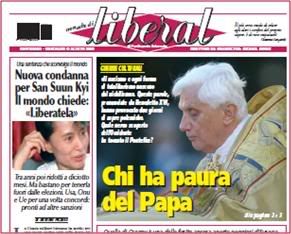
August 12, 2009
In his encyclicals Deus caritas est and Spe salvi, Benedict XVI wrote at length about the challenges from nihilism and its consequences. But apparently, Adriano Sofri never read them, although he admits explicitly that he is opposing what the philosopher Pope has said with what other philosophers have written or said.
An unlikely fuss has been stirred over words the Pope said before the Angelus last Sunday. After the very first stand-offish comments by philosopher Emanuele Severino, 80 - statements which were far afield from the Pope's words and concerns - the 'usual suspects' at Repubblica played up on Page 1 the rather obvious and banal observations of Mr. Adriano Sofri.
Who finds the opportunity to mark out in red 'the errors of Ratzinger'. Armed with 'authoritativeness' from his years of his extra-parliamentary contacts as a vocal advocate of 'radical chic' pietisms, he calls the Pope 'distracted, 'ordinary', 'a non-specialist', 'rash', 'obscuring the Nazi horror', a 'disengaged show-off', who "obscures the Nazi horror" and whose beliefs lead to "inhibiting the survival of human society even in its most elementary day-to-day relationships".
How's that from someone like Sofri who is neither a philosopher nor a theologian? [Nor particularly qualified otherwise to oppose his ideas credibly to Ratzinger/Benedict XVI!]
On the question of rights without responsibilities, the Pope's critics may read the recent Caritas in veritate. On freedom without responsibilities and the consequences of atheistic humanism, both Severino adn Sofri would benefit from reading at least Henri de Lubac.
Obviously, the Pope's words on these subjects [even if all he did was say the words last Sunday without elaborating on them] must touch live nerves in many people. The Pope's criticsm of the idolatry of freedom without responsibility must have wounded many who have become so comfortably addicted to such freedom and have racted with utterly self-absorbed exasperation.
But what did the Pope say exactly? He recalled the saints that the Church remembers liturgically this week, from St. Lawrence to Clare of Assisi, to Edith Stein and Maximilian Kolbe. He commented on the latter two to point out that, as martyrs, they testified to God in the Nazi extermination camp of Auschwitz.
Nazi lagers and Communist gulags, the Pope has said on other occasions, are "extreme symbols of evil, of the hell that opens on earth when man forgets God and substitutes himself, usurping the right to decide what is good and bad, to give life or death".
The saints, in particular, the Pope points out, "make us reflect on the differences between atheistic humanism and Christian humanism".
Whoever disagrees with the above, raise your hand, with full recognition of what the subject really is, of its related historical facts, with realism and without nonsensical improbabilities.
The antithesis between the Christian idea of man and that of the atheists has now reached 'a crucial point', precisely because Severino's much-beloved technology now allows man to 'make himself god' with all the consequences of that arrogation.
Absolute freedom places its advocates outside and independent of others and of the Other. It transforms man into 'God' - more properly, into an ape of God whose only trait is the complete arbitrariness of everything he does. And whoever has the greatest strength or power is able to impose his will on others. Read the disquieting theories of atheists like Dawkins, Harris and Onfray.
But perhaps the best advice one can give the know-all critics of the Pope is to reflect on the words of Kirillov in Dostoevsky's "The Demons' just before he commits suicide: "If there is no God, then I am God... Is it possible that there could be anyone in the whole planet who, after having finished with God and having placed all his faith in his own free will, would not detest having to proclaim tbe praises of free will in an absolute sense?"
Well, the Pope has set forth the example of saints enamored with God as an antidote to the suicide of the world, in the face of an obvious preference in the prevailing culture for the euthanasia of the West.
Evil is nihilism:
An interview with Giovanni Reale
by Riccardo Paradisi
Translated from

August 12, 2009
Reale (born 1931) is considered the world's leading scholar of ancient Greek philosophy, and has been responsible for a modern re-reading and re-interpretation of Socrates, Plato, Aristotle, Plotinus and Augustine. It is said that he was the philosopher most consulted by John Paul II.
"Many unfortunately do not understand what nihilism is," is the reply of philosopher Giovanni Reale to those who, like Adriano Sofri yesterday on page 1 of La Repubblica, maintain that it was arbitrary on the part of the Pope to trace totalitarian evil do nihilism, and man's self-promotion to being God, to atheism, even if it is 'humanistic'.
"They do not understand nihilism. Those who answer back Joseph Ratzinger with their waterd-down ideas of nihilism have never had to face it. They have not understood the terrible announcement made by Nietszche, nihilism's philosopher par excellence, about the death of God, the transmutation of all values, fidelity to the earth as the only principle of reality".
Giovanni Reale, in his book La saggezza antica [Ancient wisdom), showed analytically that all the evils of mankind today derive precisely from nihilism, the most disquieting guest, in the words of Nietszche himself, nihilism's true and terrible prophet.
"Nihilism," says Reale, "is not just a simple philosophical position - it's a way of thinking, of being, of living, that can assume many forms but whose substance is identical. Well, that substance is 'nothingness'. Many use the nihilist concept in a way that ignores this abysmal essence, in which there is no principle nor objective, there is no truth, there is no meaning. Nihilism is a black hole that sucks up everything. It relativizes and dis-assembles everything that we call human values and principles, mullifying every ontology and every metaphysics."
Nihilism is the death of God, he points out. "But not just the Christian God", he is quick to add, in reply to the Pope's critics who claim there are other kinds of religious humanism other than Christian.
"It's the death of every possible God. Of every possible idea of God, and therefore of every value and every ideal. Camus was a psychologist-metaphysicist of the highest order. And he used to say, 'Even if there is no God, I believe in values'.
"He understood very well the trap of atheism, which he called a fiction, in the sense that if values are not anchored to God, to a truth, to the principle of being, then they are revocable values. And therefore not values. They are artificial constructs that come from nothing and will end up in nothing.
"When I hear young people professing a programmed skepticism, I feel nihilism at work. It takes several forms: minimalism, ideology, 'weak thought' [apparently, this is a ccategory of contemporary thought - is it analogous to the 'weak force' in the unified theory of the cosmos?], relativism, libertinism. All masks. And if you tear off the mask, there is nothing underneath. Nietszche called these the golden masks of nihilism. Sirens who ultimately bring you to the abyss."
"If you nullify all principles but do not delude yourself, then you will realize you have reached a dead end. Without any solid point of reference. If everything is nothing, then all is allowed."
Reale cites Plato: "He understood: freedom is not an absolute value. When it is not acnhored to a truth, it becomes license, arbitrariness. By relativizing truth, arbitrariness opens the door to the demagoguery of sophists and the rule of tyrants. To see the totalitarianisms of the 20th century in this perspective does not absolve them - it is to unmask their hearts of darkness. The origin of their long march to the point when they exploded onto the surface of modernity."
"It had a great effect that the Pope said the Nazi death camps were hell on earth. Hell is the nullifcation of good, absolute arbitrariness paid for by the holocaust of others. A total detachment from truth.
"The devil was an angel who rebelled against God. The man who thinks himself god is his successor. It is the essence of nihilism - not simply to think about nothingness but even to want it.
"Those boys who threw rocks from an overpass onto pedestrians below were a sign of nihilism's influence in the world. That there need be no link between cause and effect. When they were asked why they did it, oen of them answered, 'Because we felt like doing it'.
"Pure animal instinct. In the absence of thought, feeling becomes action. To throw stones at passersby - yesterday, it was a provocation by the elite, today it is a widespread phenomenon.
"The goal of Nazism was to eliminate God from the world and place in teh center the blond beast of prey that Nietszche had forecast".
Realse says it was not just Nazism that created hell in the 20th century that was a century of horrors. Communism did the same thing, he says. It created an objective enemy to be nullified in the gulags, dissidents to be reprogrammed in labor camps or in mental asylums, children who denounced their parents for speaking of God.
Finally, Reale criticized the method of those who dispute Papa Ratzinger: "When a newspaper like Repubblica speaks about religion, it does not seem to understand anything about it. They reduce religion to politics and sociology. To people who make this a practice, I would say with Heidegger, 'If you have not had the least religious experience, then keep your hands off religious matters'. It's like asking a blind man to describe the light or a deaf man to describe music."
Much ado without reason
by Vincenzo Faccioli Pintozzi
Translated from

August 12, 2009
"Good and bad exist in all religions. It is sheer instrumentalization to postulate a correlation between Nazism and Christianity, just as it is unjust not to remember that Benedict XVI has always rightly condemned the horrors of the Shoah".
This is the opinion of David Rosen, former Chief Rabbi of Ireland, speaking out about the polemics that arose from statements made by the Pope before the Angelus prayers last Sunday.
Words which, as the editor of L'Osseevatore Romano, Giovanni Maria Vian, points out, "were not said in a lecture on history, but as a reflection on the saints whom the Church commemorates these days".
Rosen says: "I don't want to comment on the statements made by the Chief Rabbi of Italy (Eugenio Laras, president of the Italian rabbinical assembly) because I am not in my element there, and I don't think it is right to judge or belie a statement made by someone who is.
"Personally, I have no doubt that Benedict XVI is totally committed to continuing, in the best way possible, what began under John Paul II. He has been faithfully following what he inherited. [Rosen, better than anyone, should know that any and all steps that John Paul II took with the Jews since Cardinal Ratzinger came to the Vatican were with the latter's advice and theological backstop!]
"Insofar as the current polemics over the sociology or theology of the Shoah, my answer is simple: it is not for me to comment on the Pope's theology.
"We all need to remember that there were a great many good Christians who - at the risk of their own life - saved thousands of Jews during the terrible period of the Nazi persecutions. [Yes, sir! Including Pope Pius XII, but you won't concede that!]
"Of course, there have also been bad Christians, in the general sense. There are good and bad persons in every religion, who can use their theology constructively or destrctively.
"For his part, this Pope has said many times that the Shoah was the worst evil of the 20th century, and I don't think anyone can disagree with that."
Vian spoke along the same lines, underscoring that "What Benedict XVI said were short remarks addressed to the faithful before the Angelus. The Pope, remembering the saints in this liturgical week (as he did two Sundays earlier), spoke of the two martyrs of Nazism - Edith Stein, the Jewish philosopher who became Catholic and a Carmelite nun with the name Teresa Benedetta della Croce, and Maximilian Kolbe, the Polish Franciscan friar who, having been deported to Auschwitz, offered to die in place of a father who had been condemned to be starved to death. [Kolbe somehow survived the starvation period and had to be killed by a lethal injection.]
"In this context, the Pope therefore recalled once more the horror of the concentration camps, of all concentration camps, and of the Shoah. There is no doubt that Benedict XVI only has total condemnation for the Holocaust, notwithstanding the accusations made these days that he knows little of history and even less of philosophy - statements that speak for themselves.
"Benedict XVI was addressing everyone with simple words that do not deserve to be instrumentalized, as Rabbi Rosen said. Nazism was characterized by a pagan ideology to which even Christians unfortunately adhered, an ideology that was clearly anti-Jewish and against the Jewish roots of Christianity, therefore, anti-Christian as well.
"Not a few opponents in Germany, Catholics above all but also many Protestants, were persecuted and killed. Think of the beatification of the martyrs of Nazism by John Paul II. And historically, there is no doubt that National Socialism and Christianity were incompatible realities.
"As for his reference to nihilism, it is a discourse that Benedict XVI has been making for some time, which he reiterated on Sunday, well aware of its complexity, therefore referring to 'the great writers and thinkers' who have dealt with the subject. And he referred to nihilism to reiterate that substituting oneself for God, or wanting to eliminate God from the human horizon, can lead to enormous consequences such as the Nazi death camps, which he called the 'culminating point of an ample and widespread reality that often has moving boundaries'.
"So I think all the critical reactions were unfounded".
According to Anna Foa, professor of modern history at La Sapienza University in Rome [and first regular female contributor to OR], "the statements of rabbis Di Segni and Laras about the Shoah as a metaphor for absolute evil should be set aside. I don't think the Pope was making a historical discourse about the Holocaust.
"On the other hand, Sofri maintains that the Pontiff meant to say that any person who is not Christian in a Christian humanistic way will somehow end up in absolute evil. And I don't think that the Pope intended to say that at all - that's all polemical journalism.
"But I do think something must be said on this subject: there is a non-religious humanism which nonetheless has faith in strong ethical values. Ethics need not always be linked to religion. There is no ethics of evil, only ethics of goodness. [But that's precisely the concept of ethics that Benedict XVI wants to emphasize in his advocacy of the natural law 'inscribed in every heart' that everyone can accept, regardless of religion or lack of it, which happen to correspond to the basic values that the Church preaches.]
"At the same time, as history has shown, religion can also lead to evil. Faith does not necessarily lead to goodness, nor to evil, for that matter. In this respect, Sofri was right. But not about denying the Pope's right to use the Shoah as a metaphor."
[Modificato da TERESA BENEDETTA 14/08/2009 23:19] |
| |
 13/08/2009 15:56 13/08/2009 15:56 |
|
| | | OFFLINE | | Post: 18.158
Post: 816 | Registrato il: 28/08/2005
Registrato il: 20/01/2009 | Administratore | Utente Senior | |
|

Thursday, August 13
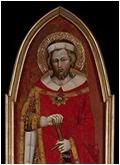 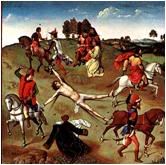 Saints Pontianus, Pope (230-235) and
Saints Pontianus, Pope (230-235) and
Hippolytus, Priest (170-235), Martyrs
(Both died in Sardinia where they were exiled
by Emperor Maximinus Thrax)
OR today.
 
Benedict XVI at the General Audience on the special motherhood of Mary:
'The link with Mary transforms the lives of priests'
The Pope appeals for the Southeast Asian victims of a recent typhoon.
No papal pictures on Page 1 today, despite the main story. Other Page 1 stories: Afghanistan's coming presidential elections
under Taliban threat; UNICEF says 700,000 children are victims of chronic hunger in the Central African Republic; and
'Wall Street remains uncertain' [The OR persists in making snap conclusions about the US economy based on a single day's developments.
Yesterday their headline on the US economy was: 'The recession has halted"! It's not their place - no one expects them to be the Financial Times
or the Wall Street Journal! In their news reports, they should report facts, not their perception or interpretation of fact.]
No events scheduled for the Holy Father today.
The Vatican released the text of the Pope's letter appointing Cardinal Christoph Schoenborn of Vienna
to represent him at the millennium anniversary of the Diocese of Pecs in Hungary on August 23.
[Modificato da TERESA BENEDETTA 15/08/2009 01:07] |
| |
 14/08/2009 15:17 14/08/2009 15:17 |
|
| | | OFFLINE | | Post: 18.160
Post: 818 | Registrato il: 28/08/2005
Registrato il: 20/01/2009 | Administratore | Utente Senior | |
|
 Apcom, which first reported on this year's Ratzinger Schuelerkreis reunion seminar in Castel Gandolfo, adds details about it in a report that reviewed the Pope's known public activities for the rest of the summer (earlier summarized by the OR). Both previous reports were posted on this thread.
The Pope and his Schuelerkreis:
Apcom, which first reported on this year's Ratzinger Schuelerkreis reunion seminar in Castel Gandolfo, adds details about it in a report that reviewed the Pope's known public activities for the rest of the summer (earlier summarized by the OR). Both previous reports were posted on this thread.
The Pope and his Schuelerkreis:
Resource persons revealed

ROME, August 14 (Translated from Apcom) -Pope Benedict XVI's former students will be arriving at Castel Gandolfo on August 27 for the annual Ratzinger Schuelerkreis reunion seminar.
The Schuelerkreis includes some 40 theologians who obtained their doctorates from German universities under the advisorship of then Prof. Joseph Ratzinger.
Tney will be joined again this year by the so-called 'new Schuelerkreis' - 17 younger theologians who have specialized in Joseph Ratzinger's theology and who first joined the Castel Gandolfo seminars last year.
The seminar will last till August 30, but the Pope is expected to spend only Saturday, August 29, with them, when he will join their discussions for the whole day .
As usual, they have invited resource persons to speak to them in depth about their chosen topic for the year's gathering - this time, about 'mission'.
The two invitees, both specialists in the theology of mission, are Peter Beyerhaus, a Protestant theologian; and Horst Buerkle, who was also an Evangelical Lutheran but who converted to Catholicism at the end of thw 1980s and is a professor emeritus of the Ludwig-Maximilian University of Munich [Joseph Ratzinger's Alma Mater]. Catholic seminaries have faculties for 'missionology'.
It is not known which aspects of mission the Schuelerkreis seminar will focus on, but both resource persons have studied in depth the relationships, encounters and confrontations of Catholic missionaries with other religions.
While pointing out the elements that Christianity has in common with other religions, they have warned of the double risk for missionaries - an excessive distance from believers of other faiths, on the one hand, and the risk of syncretism which would make Christianity a religion just like any other.
The Pope will say Mass for his former students on Sunday, August 30, to formally end this year's reunion.
Afterwards, the Pope faces a pastoral visit to Viterbo and Bagnoregio on Sept. 6 and his apostolic trip to the Czech Republic on Sept. 26-28.
The Pope is also expected to make new Curial announcements soon, including the reassignment of the current undersecretary for foreign relations, Mons. Pietro Parolin, to be the new Apostolic Nuncio to Venezuela.
[Modificato da TERESA BENEDETTA 14/09/2009 21:06] |
| |
 14/08/2009 15:35 14/08/2009 15:35 |
|
| | | OFFLINE | | Post: 18.161
Post: 819 | Registrato il: 28/08/2005
Registrato il: 20/01/2009 | Administratore | Utente Senior | |
|

Friday, August 14
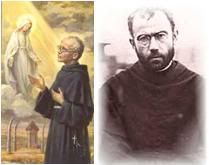 ST. MAXIMILIAN KOLBE (Poland, 1894-1891)
ST. MAXIMILIAN KOLBE (Poland, 1894-1891)
Franciscan, Martyr
OR today.
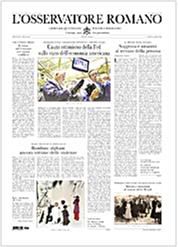 The only papal story in this issue is the Pope's letter naming Cardinal Schoenborn
The only papal story in this issue is the Pope's letter naming Cardinal Schoenborn
to represent him at the 100th anniversary celebration of the Diocese of Pecs in Hungary.
Page 1 stories: US Federal Reserve cautiously optimistic about the economy; Russia's
Putin provokes new fears of conflict with Georgia as he urges UN recognition of
the breakaway states of Abkhazia and Ossetia; Taliban terrorist attacks in Afghanistan
do not spare children; a commentary praising a compassionate approach to end-of-life
issues in France as a model for other European countries. A major story in the inside
pages is a revelation of how both the US and UK governments ignored repeated warnings
from the Jewish representative in Switzerland starting in August 1942 of Germany's
extermination plan for the Jews - even as between 1943 and the liberation of Italy
in 1944, Pius XII was the only leader on the world scene who actually did anything
to help the Jews.
No events scheduled for the Holy Father today.
|
| |
 14/08/2009 17:02 14/08/2009 17:02 |
|
| | | OFFLINE | | Post: 18.162
Post: 820 | Registrato il: 28/08/2005
Registrato il: 20/01/2009 | Administratore | Utente Senior | |
|
 The Italian newspapers yesterday buzzed with reports that Prime Minister Silvio Berlusconi is supposedly determined to be in Viterbo for the Pope's coming visit, with the insinuation that this would be unseemly in view of Berlusconi's widely reported extra-marital indiscretions for which his wife is seeking to divorce him.
The Italian newspapers yesterday buzzed with reports that Prime Minister Silvio Berlusconi is supposedly determined to be in Viterbo for the Pope's coming visit, with the insinuation that this would be unseemly in view of Berlusconi's widely reported extra-marital indiscretions for which his wife is seeking to divorce him.
AGI reports a response from the Vatican.
It's entirely up to Berlusconi,
Vatican officials say
By SALVATORE IZZO

VATICAN CITY, August 14 (translated from AGI) - "When the Pope makes a pastoral visit, the civilian authorities who welcome him always include those who represent the Italian nation, and thus honor him with their presence. It is up to the government to decide whom these representatives should be".
This was underscored to AGI today by a Vatican dignitary who is usually part of the Pope's entourage on his trips away from the Vatican.
"It is never the case that the Pontiff refuses to meet the representatives of the Italian government, since it is his duty to welcome them and listen to them - in the interests of continuing dialog on matters of peace, justice and the defense of the values that the Catholic Church advocates for the Catholic community and in behalf of the weakest members of society," he continued.
"Therefore, if it is Prime Minister Berlusconi who will represent the national government in Viterbo on September 6, Benedict XVI will be just as happy."
Already last July, Vatican press director Fr. Federico Lombardi, had brushed aside reports that Berlusconi had been denied a papal audience on the occasion of the G8 summit In Italy, saying that it had not been requested. [Also, the Pope had written a widely publicized letter to Berlusconi, in his capacity as current G8 president, on the eve of the G8 summit to articulate his hopes for positive action by the rich nations towards the poorer ones, especially those in Africa.]
At the same time, it is obvious that governments seek to respect the Pope's opportunity for a rest period in summer, when his public activities are reduced to a minimum.
This respect is particularly dutiful on the part of the Italian government, whose representatives have more opportunities than those from other nations to meet with the Pope during the rest of the year.
Moreover, there have been no reports in recent memory of any papal audience that was denied or postponed for any reason such as those suggested by the Italian media about Berlusconi (his personal life).
An exception was Pius XII's refusal to meet with Italy's postwar Prime Minister Alcide De Gasperi, who had requested a private audience to mark his wedding anniversary shortly after tensions had developed with the Vatican over some policy decision by De Gasperi's Christian Democratic government.
On the other hand, John Paul II defied widespread objections against meeting with then Austrian President Kurt Waldheim, ex-Secretary General of the United Nations, who had admitted his wartime association with the Nazis.
The Vatican said then that the Pope could not possibly refuse to meet a head of state who had been legitimately elected.
It will also be recalled that Pius XI would have been willing to meet with Adolf Hitler in 1938 when the latter came to visit Italy in order to speak to him directly about stopping anti-Catholic persecution in Germany.
But the Pope was constrained to leave the Vatican for Castel Gandolfo before Hitler arrived to avoid the embarrassment that Hitler was coming to Rome but not to the Vatican.
So many other personages judged negatively by history have been received at the Apostolic Palace with all the honors due any visiting head of state or government - from Zaire dictator Mobutu to the Sandinista Daniel Ortega whose government included many priests defiant of the Church.
"The Pope welcomes all visitors without raising an accusing finger. He is, after all, the Successor of Peter, whom Jesus pardoned even if he had denied him three times," the Vatican prelate noted.
Italian leaders, of course, do not lack for opportunities to meet the Pope if they wish to. In June 2007, for example, then Prime Minister Romano Prodi showed up to welcome Benedict XVI to Assisi the day after three of his ministers took part in a Gay Pride parade in Rome which featured terrible accusations made in public against Benedict XVI and his private secretary. [I had not previously read anything about these before - apparently, the Italian media exercised a rare but praiseworthy editorial discretion at the time, although they reported the usual 'obscurantist' rants agains the Pope.]
But Prodi's presence was seen as an act of respect intended to make up somehow for those offenses.
 Another huge buzz in the Italian media these days is over a recent decision by a regional court affecting the rights of Catholic teachers of religious instruction in Italy's public schools, where an hour of religious instruction every week is mandated under the terms of the Vatican Concordat with the Italian government - and in view of Italy's history and overwhelmingly Catholic population.
Another huge buzz in the Italian media these days is over a recent decision by a regional court affecting the rights of Catholic teachers of religious instruction in Italy's public schools, where an hour of religious instruction every week is mandated under the terms of the Vatican Concordat with the Italian government - and in view of Italy's history and overwhelmingly Catholic population.
Although attendance is not mandatory, 90 percent of Italian schoochildren (obviously with their parents' consent) have chosen to attend these classes consistently over the past several decades, for which they get scholastic credit. Those who opt not to attend religious instruction can choose other activities as a substitute and get equivalent credit. (By the way, the 'religious instruction' is deliberately not Catholic catechesis but rather a cultural appreciation of what Catholicism has meant to the Italian nation. For this reason, many non-Catholic children also attend the classes.)
Apparently, the court decision has to do with such credits, and with the credentialling status of the religious instructors, usually provided by the diocese but paid by the state. I can't understand all the intricacies, but the Italian bishops' conference is protesting the court decision as an attempt to do away with the religious instruction mandate, and a judiclal rejection of guidelines issued years ago by the Italian ministry of education.
I am hoping Sandro Magister will come up with a summary soon that the non-Italian public can understand and appreciate.
[Modificato da TERESA BENEDETTA 14/08/2009 17:24] |
| |
 15/08/2009 11:29 15/08/2009 11:29 |
|
| | | OFFLINE | | Post: 18.169
Post: 827 | Registrato il: 28/08/2005
Registrato il: 20/01/2009 | Administratore | Utente Senior | |
|
 I continue to be surprised by the philosophical discussion that has been going on in the Italian newspapers about the Holy Father's almost incidental words on Nazism and nihilism in last Sunday's Angelus.
I continue to be surprised by the philosophical discussion that has been going on in the Italian newspapers about the Holy Father's almost incidental words on Nazism and nihilism in last Sunday's Angelus.
It's not the sort of discussion that Anglophone secular newspapers would even dream of encouraging in their editorial and op-ed pages, much less on Page 1. Part of it must be that few Anglophone editors and journalists today have the advantage of what used to be called a 'classical' education, in which a person was expected to be familiar with the history of Western thought including philosophy and religion, with all the Great Books of world literature, as well as 2 or more modern languages besides his native tongue and certainly, some Latin and Greek, as well.
In some ways, the better Italians continue to manifest Old World culture - after all, they continue to teach their children Latin in high school - despite the sorry state of much of Italian pop culture, and for the Pope's sake, and on that count, we must be thankful that the Vatican is in Italy.
Why do the seculars call the Pope
ignorant and dogmatic when
he proposes examining the transcendent?
by Costantino Esposito
Translated from

August 12, 2009
The debate sparked by recent words by Benedict XVI on the nihilist tendency of contemporary thought and its double slope - the dictatorship of rationalism, on the one hand, and that of relativism on the other - would seem to merit less hasty reactions, without blocking off the playing field between those who dogmatically maintain there is revealed truth as against man's freedom to search for the truth and those who exalt the absolute freedom of every human being to make his own choices against the idea that there could be any objective experience of the truth.
The first reaction that comes spontaneously, to whoever observes the issue not from standard positions but from a dispassionate comprehension of his own experience, is that in some way we are all nihilists, to the degree in which the great existential, cultural and social question that traverses our life.
In the words of Feodor Dostoevsky - one of the great interpreters of nihilism, which he saw as the most dramatic spiritual 'event' of the modern era: whether man succeeds or fails to save himself, that is to say, to fulfill with his own powers the destiny of happiness to which every "I' feels called to.
"If men are deprived of the infinitely great", he observed in The Demons, "then they can no longer live and they would die in the grip of despair" (Vol II, p. 709, Italian ed., Garzanti).
The problem of nihilism, I think, is focused on this condition: if man needs to live for something or someone that makes it worth living, then he is faced with the fundamental option of identifying what it is that makes life worth living.
It's a question that is not always decided once and for all: there is no philosophy or religion that can present an individual from being personally committed to finding that something, thus exercising his individual freedom.
The infinite meaning of self and of the world - if there is any - can manifest itself, in fact, only in my freedom to choose, in my conscious participation, and in offering my life with love.
These are questions that everyone can understand easily simply by recalling what it has meant in one's own personal experience to be welcomed, to be wanted by another, to be myself, thanks not only to my own abilities but through my relationship to a reality that accepts and confirms me for who and what I am.
The truth of the world has to do with a situation of this kind (it will be discussed in the next Rimini Meeting of Comunione e Liberazione, on the theme "Knowledge is always an event'), and cannot simply be reduced to a doctrine or a moral program, nor with a pre-fabricated ideology or an undefined utopia.
And while the illusion of every 'rationalism' is that it can measure with human standards an unmeasurable ideal, the presumption of every 'relativism' is that of denying that the human mind consists of this infinite desire, or rather, that it is made for the infinite.
Some intellectuals have pointed out - resenting and annoyed by what they consider to be an over-simplification and ingenuousness on the part of the Pope - that nihilism is something else in philosophy.
They say that nihilism (I will say it in my own words) is not only the 'devaluation of all the values of tradition', and the 'death of God' and the positing of 'new values that are immanent and anti-humanistic (Nietzsche), but also the discovery that in an era of rampant technology - an era in which what is valuable are only those things (entities) determined and created by our plans) and nothing else, we have forgotten all about the mystery of being.
This has happened not of our choice, but because the self itself rejects being held in the grip of our ideas and slips away every time we try to grasp it.
In its most enigmatic aspect (Heidegger and indirectly Wittgenstein), nihilism would be when nothing is left of being, because the self can no longer 'make itself present' among the more 'important' entities. And the truth of anything becomes literally 'impossible', because unlike everything else in the world of technology, it cannot be calculated, it cannot be assigned a numerical value. As such, it cannot be encountered nor anticipated, and nothing can no longer be considered a 'sign' of truth.
The stake in play after Benedict's challenge is that, far from ignoring this elevated philosophical issue, there must be a different way to face the problem.
The question is: will it be possible to know something 'impossible' as Derrida calls it)? Is there a way to 'tough the infinite' (Descartes's term)? Or is impossibility man's ultimate destiny?
Christ is most interesting for the human quest precisely because he represents the possibility of the impossible, by offering a way that is real and sensible to the measure of our knowledge and our freedom.
Benedict XVI spoke of this possibility in pointing to the testimony of the two martyr saints of Auschwitz, Edith Stein and Maximilian Kolbe, who in front of the bloody hell of insignificance and negation of every possibility that the death camps were, never lost sight of their reason for living, something so evident that for it, one would willingly give one's life. A reason that made itself felt as presence, a real presence.
It is the same all-consuming presentiment that I found in another great 'nihilist' of the 20th century, the English writer Virginia Woolf, when she wrote about the 'moments of being' that make up our daily lives, which are however 'engulfed in moments of non-being which are far more numerous', as though the 'goodness' of reality were 'wrapped in a kind of amorphous padding', that is, by insensitivity and lack of satisfaction.
She continues that only 'a violent shaking', that is, 'exceptional moments', can open a rip in that padding and make things apparent and become reality.
"The warning against nihilism opens up an opportunity: I would say that out of it, a philosophy is born, or at least, an idea I have always had - that behind all that padding, there is a design; that we - all human beings - are part of that design; that the entire world is a work of art; and that we are all part of that work of art" ( Moments of being: Autobiographical writings, ed la Tartaruga, Milan 2003).
[Modificato da TERESA BENEDETTA 15/08/2009 19:32] |
| |
 15/08/2009 14:16 15/08/2009 14:16 |
|
| | | OFFLINE | | Post: 18.170
Post: 828 | Registrato il: 28/08/2005
Registrato il: 20/01/2009 | Administratore | Utente Senior | |
|

Saturday, August 15
 SOLEMNITY OF THE ASSUMPTION OF MARY
SOLEMNITY OF THE ASSUMPTION OF MARY
OR today.

Page 1 stories: Europe's central bank proposes incentives for employment programs;
new unemployment figures in the US rise again; the EU criticizes Russia's Putin
for visit to the Georgian secessionist state of Abkhazia; and the EU issues
more severe sanctions against Myanmar for new Aung San Suu Kyi verdict. The OR
continues its presentation of major religious feasts as observed in the Byzantine
tradition, which celebrates Mary's Assumption as the more traditional Dormition
(Falling asleep) of Mary. In the inside pages, a story on Viterbo, city of Popes,
which Benedict XVI is visiting on Sept. 6.
THE POPE'S DAY
Mass of the Assumption - The Holy Father offered the Mass at the parish church of Castel Gandolfo. Homily.
Angelus - From the inner courtyard of the Apostolic Palace, a holiday Angelus as customary on a major religious holiday.
|
| |
 15/08/2009 17:49 15/08/2009 17:49 |
|
| | | OFFLINE | | Post: 18.171
Post: 829 | Registrato il: 28/08/2005
Registrato il: 20/01/2009 | Administratore | Utente Senior | |
|
 MASS OF THE ASSUMPTION
MASS OF THE ASSUMPTION
 The parish church of Castel Gandolfo, dedicated to St. Thomas Villanova and designed by Bernini, is located across the piazza
The parish church of Castel Gandolfo, dedicated to St. Thomas Villanova and designed by Bernini, is located across the piazza
from the front entrance of the Apostolic Palace (below, bottom left):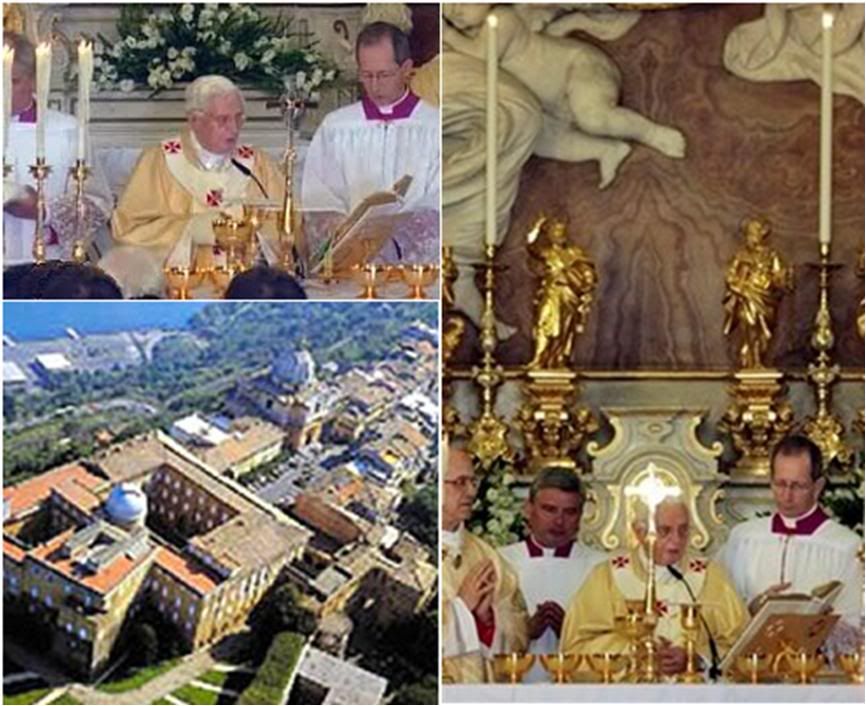 Here is a translation of the Holy Father's homily:
Here is a translation of the Holy Father's homily:
THE HOLY FATHER'S HOMILY
Venerated brothers in the Episcopate and Priesthood,
Dear brothers and sisters:
The solemnity today crowns the cycle of major liturgical celebrations at which we are called on to contemplate the role of the Blessed Virgin Mary in the history of salvation.
In fact, the Immaculate Conception, the Annunciation, Divine Motherhood and the Assumption are fundamental stages, intimately linked to each other, through which the Church exalts and sings the glorious destiny of the Mother of God, and in which we can also read our own history.
The mystery of Mary's conception reaches back to the first page of the human story, to remind us that in the divine plan of creation, man was meant to have the purity and the beauty of the Immaculate .
That plan, which was compromised but not destroyed by sin, was recomposed through the incarnation of the Son of God, which was announced and realized in Mary, and restituted to acceptance in the faith by man.
In the Assumption of Mary, we finally contemplate that which we are called to reach, in following Christ the Lord and in obedience to his Word, at the end of our journey on earth.
The last stage of the earthly pilgrimage of the Mother of God invites us to consider how she followed her path towards the goal of glorious eternity.
In the Gospel passage that was just proclaimed, St. Luke recounts that Mary, after the Angel's announcement, "set out and traveled to the hill country in haste" to visit Elizabeth (Lk 1,39).
The evangelist, saying this, intended to underscore that for Mary, to follow her own calling, in obedience to the Spirit of God which had caused in her the Incarnation of the Word, meant following a new path and indeed, to immediately undertake a trip outside her own home, allowing herself to be led only by God.
St. Ambrose, commenting on Mary's 'haste', states: "The grace of the Spirit does not bear with slowness" (Expos. Evang. sec. Lucam, II, 19: PL 15,1560).
The life of our Lady was guided by an Other - "Behold the handmaid of the Lord: be it done unto me according to your Word" (Lk 1,38) - it was shaped by the Holy Spirit, marked by events and encounters like that with Elizabeth, but above all, by her most special relationship with her son Jesus.
It was a path in which Mary, electing to meditate in her heart the events of her existence, saw ever more profoundly in those events the mysterious plan of God the Father for the salvation of the world.
Being with Jesus in Bethlehem to the flight to Egypt, in his hidden life and his later public life, to the foot of the Cross, Mary lived her constant ascent towards God in the spirit of her Magnificat, adhering fully - even in moments of darkness and suffering - to God's loving plan and nourishing in her heart her total abandonment into the hands of the Lord, becoming a paradigm for the faith of the Church (cfr Lumen gentium, 64-65).
All life is an ascent, all life is meditation, obedience, confidence and hope, even in the darkness. And all life is this 'sacred haste' which knows that God is always the priority and nothing else merits haste in our existence.
Finally, the Assumption reminds us that the life of Mary, like that of every Christian, is a journey in the footsteps of Jesus, a journey that has a very precise goal, a future that has already been mapped out: the definitive victory over sin and death, and full communion with God, because, as Paul says in the Letter to the Ephesians, the FAther has "raised us up with him, and seated us with him in the heavens in Christ Jesus" (Eph 2,6).
This means that with Baptism, we have fundamentally been resurrected and we seat in heaven with Christ Jesus, but we must corporally reach what was begun and realized in Baptism.
In us, the union with Christ, resurrection, is incomplete, but for the Virgin Mary, it was fulfilled, despite the path that even she had to take. She has entered into the fullness of union with God, with her Son, and she draws us on and accomopanies us in our own journey.
In Mary assumed into heaven, we contemplate her, who through a singular privilege, was made a participant, in body and soul, in Christ's definitive victory over death.
"On the completion of her earthly sojourn," says the Second Vatican Council, "she was taken up body and soul into heavenly glory, and exalted by the Lord as Queen of the universe, that she might be the more fully confimed to her Son, the Lord of lords and the conqueror of sin and death" (Lumen gentium, 59).
In the Virgin assumed into heaven, we contemplate the coronation of her faith, of that journey of faith that she shows the Church and each of us: she who at every moment accepted the Word of God, was assumed into heaven, welcomed by her own Son to that 'dwelling' which he has prepared for us with his death and resurrection (cfr Jn 14,2-3).
Man's life on earth - as today's First Reading reminds us - is a journey which takes place constantly in the tension of the struggle between the snake and the woman, between evil and good. And this is the human situation: it is like a voyage at sea that is often tempestuous; Mary is the star who guides us towards her son Jesus, the sun who rises above the shadows of history" (cf Spe salvi, 49) - she gives us the hope that we need: the hope that we can win, because God has won, and with our Baptism, we share in this victory.
We will not succumb: God helps us and guides us. This is hope: this presence of God in us, and it becomes visible in Mary assumed into heaven.
"In her," as we will read shortly in the Preface, "you have caused to shine on your people who are pilgrims on earth a sign of comfort and true hope".
With St. Bernard, mystic singer of the Virgin's praises, let us then invoke her: "We pray to you, o Blessed One, by the grace that you found, by the prerogatives that you merited, by the Mercy to which you gave birth, He, who through you deigned to take part in our poverty and infirmity, that through your prayer we may take part in your graces, in your beatitude and eternal glory - Jesus Christ, your Son, our Lord, who is above all things, God blessed for ever and over. Amen (Sermo 2 de Adventu, 5: PL 183, 43).
The Pope walks across the town piazza to and from the parish church for the Mass of the Assumption.
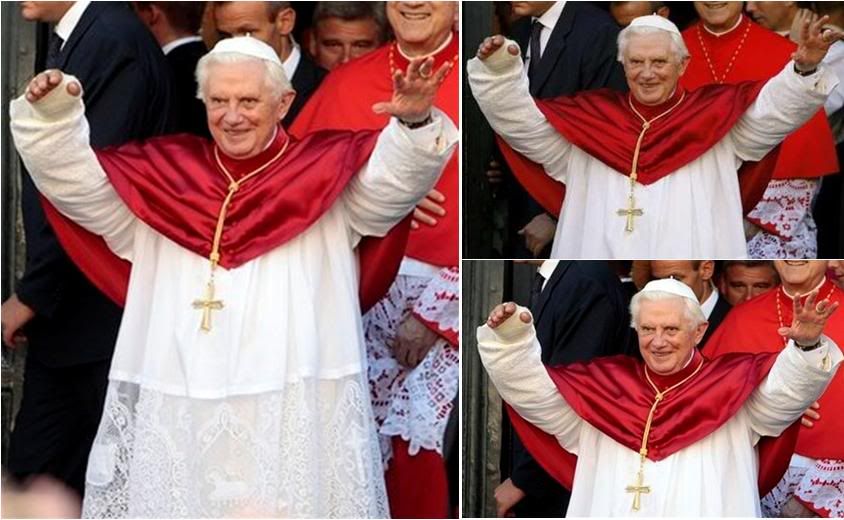
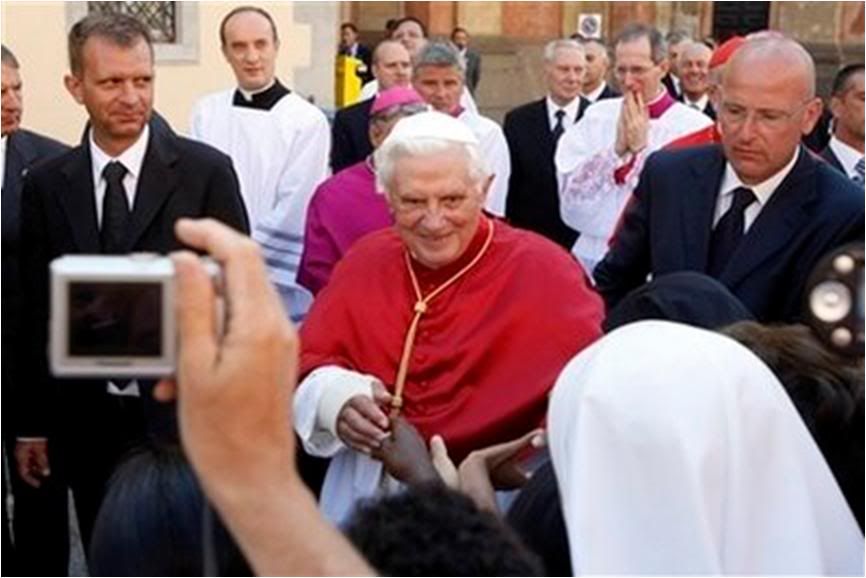
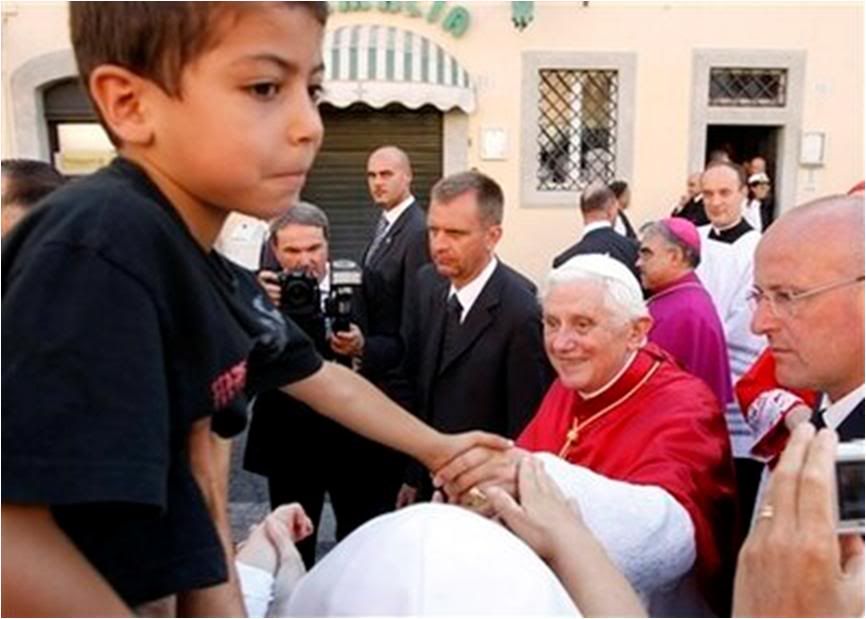
 ANGELUS
ANGELUS

 Here is a translation of the Pope's words before the Angelus:
Here is a translation of the Pope's words before the Angelus:
Dear brothers and sisters!
In the heart of the month of August, holiday time for most families, the Church celebrates the solemnity of the Assumption of the Blessed Virgin.
This is a propitious occasion to meditate on the ultimate meaning of human existence, aided by the liturgy today which invites us to live in this world always oriented towards eternal benefits, in order to share the glory of Mary, our Mother (cfr Collect prayer).
Therefore, let us direct our attention towards Our Lady, Star of Hope who illuminates our earthly journey, following the example of the saints who have had recourse to her in every circumstance.
We are celebrating the Year for Priests in memory of the Holy Cure of Ars, and i wish to draw from the thoughts and testimony of this sainted country curate some points of reflection which can help us all, especially we who are priests, to reinvigorate our love and veneration for the Most Blessed Virgin.
His biographers attest that St. Jean Marie Vianney spoke of Our Lady with devotion, and at the same time, with intimate confidence and immediacy.
"The Blessed Virgin," he used to say, "is spotless, adorned with all the virtues that make her so beautiful and pleasing to the Most Holy Trinity" (B. Nodet, Il pensiero e l’anima del Curato d’Ars, Torino 1967, p. 303).
Moreover: "The heart of this good Mother is nothing but love and mercy - all she wants is to see us happy. All we need to do is turn to her in order to be heard" (ivi, 307).
Shining through these expressions is the zeal of the priest moved by apostolic desire, who rejoiced in speaking of Mary to the faithful, and never tiring of it.
He knew how to effectively present even an arduous mystery like that of the Assumption, by saying, for instance: "Man was created for heaven. The devil shattered the stairway to heaven. Our Lord, with his Passion, gave us another... The most Blessed Virgin is at the top of this stairway and holds it in her hands" (ibid).
The Holy Cure of Ars was attracted above all by the beauty of Mary, a beauty which coincided with being the Immaculate, the only creature conceived without a shadow of sin.
"The Blessed Virgin," he said, "is that beautiful creature who never ever displeased God" (ivi, 306). As a good and faithful shepherd, he led by example, above all, even in filial love for the Mother of Jesus, by whom he felt himself drawn to heaven.
"If I do not go to heaven," he exclaimed, "how sad I would be that I would never see the Blessed Virgin, this most beautiful creature" (ivi 309).
He consecrated his parish more than once to Our Lady, and recommended to the mothers of his parish to do the same every morning with their own children.
Dear brothers and sisters, let us make ours the sentiments of the Holy Curate of Ars. With the same faith, let us address Mary assumed into heaven, entrusting to her most especially the priests of the whole world.
After the Angelus, he said this in English:
I am happy to greet all the English-speaking pilgrims and visitors gathered here at Castel Gandolfo and also in Saint Peter’s Square.
As we celebrate the Solemnity of the Assumption of the Blessed Virgin, we are invited to raise our eyes to heaven and contemplate Mary, the Mother of Jesus and our Mother. She who on earth believed in God’s word is now glorified in body and soul.
May Mary’s intercession and example guide you always and renew your hearts in faith and hope. May God grant you and your families abundant blessings of peace and joy!
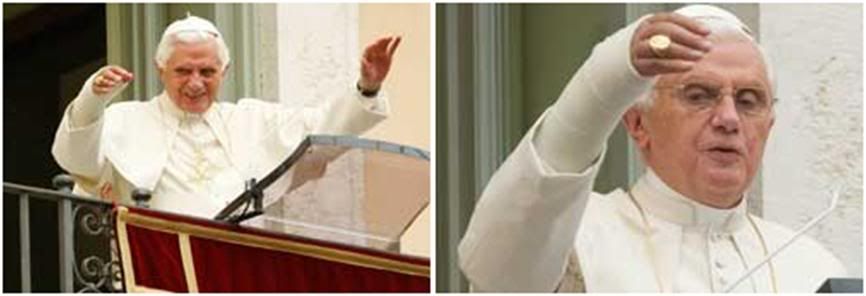
 As in the past Angelus and General Audience held at Castel Gandolfo, the Holy Father had to bless the overflow crowd in the piazza
As in the past Angelus and General Audience held at Castel Gandolfo, the Holy Father had to bless the overflow crowd in the piazza
from the front window of the Apostolic Palace after his discourse in the inner courtyard.
P.S. A curious incident during the Pope's Mass today is reported by La Repubblica online:
German woman screams
during the Mass
A woman who was attending the Mass of the Assumption celebrated by the Pope in Castel Gandolfo today suddenly started screaming words in German.
She was immediately taken out by the Swiss Guard and the Vatican police.
It happened shortly after the Pope ahd delivered his homily. The incident did not interrupt the Mass which went on normally.
The woman, about 35 years old, had a ticket to attend the Mass. Wintesses say she seemed to have gone into a mystic trance when she acted up. She offered no resistance when she was led out of the Church.
[Modificato da TERESA BENEDETTA 17/08/2009 00:11] |
| |
|
|
|
|